



Display to June 30, 2023 HK$40 Hong Kong’s Best Selling Business Magazine Issue No. 70 FUNDING SHIFTS TO DEEP TECH AS GENERATIVE AI DRIVES INVESTMENTS MBA COMPETES WITH SPECIALISED POSTGRAD PROGRAMMES THROUGH AI CONSUMERS CRAVE HUMAN CONNECTION AMIDST THE ERA OF AUTOMATION VC VERSUS ENTREPRENEUR ‘STAND-OFF’ DECREASES FUNDING VOLUME KEY SKILLS INSURERS ARE LOOKING FOR IN NEW HIRES IN 2023 SURVEY
HOTTEST STARTUPS
HONG KONG AWAR D S 2022 MA D E IN AWAR D S 2022 HONG KONG D ESIG N ED I N
MBA PROGRAMMES RANKINGS
2023




Established 1982
Editorial Enquiries: Charlton Media Group Hong Kong Ltd
Room 1006, 10th Floor, 299 QRC, 287-299 Queen’s Road Central, Hong Kong | +852 3972 7166
PUBLISHER & EDITOR-IN-CHIEF Tim Charlton ASSOCIATE PUBLISHER Louis Shek
PRINT PRODUCTION EDITOR COPY EDITOR

PRODUCTION TEAM
FROM THE EDITOR
COMMERCIAL TEAM GRAPHIC ARTIST
Jeline Acabo
Tessa Distor
Noreen Jazul
Consuelo Marquez
Djan Magbanua
Frances Gagua
Charmaine Tadalan
Janine Ballesteros
Jenelle Samantila
Simon Engracial

ADVERTISING CONTACTS Louis Shek +852 6099 9768 louis@hongkongbusiness.hk
Aileen Cruz aileen@charltonmediamail.com

Reiniela Hernandez reiniela@charltonmediamail.com
ADMINISTRATION ACCOUNTS DEPARTMENT accounts@charltonmediamail.com
ADVERTISING advertising@charltonmediamail.com EDITORIAL editorial@hongkongbusiness.hk
PRINTING
Gear Printing Limited

Flat A, 15/F Sing Teck Fty. Bldg., 44 Wong Chuk Hang Road, Aberdeen, Hong Kong

Can we help?
Editorial Enquiries: If you have a story idea or press release, please email our news editor at editorial@hongkongbusiness.hk. To send a personal message to the editor, include the word “Tim” in the subject line.
Media Partnerships: Please email editorial@hongkongbusiness.hk with “Partnership” in the subject line.
Subscriptions: Please email subscriptions@charltonmedia.com.
Hong Kong Business is published by Charlton Media Group. All editorial is copyright and may not be reproduced without consent. Contributions are invited but copies of all work should be kept as Hong Kong Business can accept no responsibility for loss. We will however take the gains.
Sold on newstands in Hong Kong, Macau, Singapore, London, and New York.
*If you’re reading the small print you may be missing the big picture
Deep tech is increasingly getting popular in many sectors. Emerging startups are developing deep-learning applications to enhance the productivity of traditional processes, and experts believe that more startups will build upon their business models on generative AI applications such as text bot ChatGPT. In this year’s Hottest Startups list, we feature companies categorised as deep tech. See them and the rest of this year’s outstanding startups on page 30.
As the modern workforce evolves, MBA education is changing to keep pace with the new demands. MBA programmes are expanding globally despite cost pressures, and providers are offering experiential learning programmes through disruptive tech. In this issue, we rank the top MBA providers that included state-of-the-art innovations in their curriculum as demand for advanced digital skills rises. See the full story and list of MBA programmes and providers on page 26.
Top companies and initiatives are acclaimed at the latest Hong Kong Business Management Excellence Awards, Made in Hong Kong Awards, Designed in Hong Kong Awards, and Greater Bay Area Awards. Take a look at the list of exceptional executives and teams on pages 46, 52, and 56.
Read on and enjoy!
Tim Charlton
HongKongBusiness is available at the airport lounges or onboard the following airlines:





HONG KONG BUSINESS | Q2 2023 1
HONG KONG BUSINESS
46 Recognising the top executives and companies at the 2022 HKB MEA

52 Here are the winners of the HKB Made in & Designed in Hong Kong Awards 2022

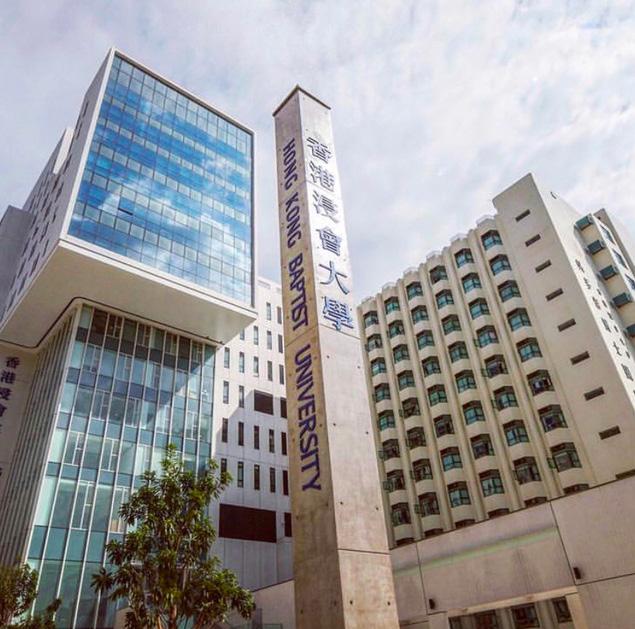

56 Exemplary companies and organisations were recognised in this year’s HKB Greater Bay Area Enterprise Awards




2 HONG KONG BUSINESS | Q2 2023 JANUARY 2019 Published Quarterly by Charlton Media Group Pte Ltd, Room 1006, 10th Floor, 299QRC, 287-299 Queen’s Road Central, Sheung Wan, Hong Kong For the latest business news from Hong Kong visit the website www.hongkongbusiness.hk CONTENTS STARTUPS 22 Jumppoint offers AI-driven courier routing to deliver to underserved markets FIRST BRIEFINGS INTERVIEW 30 HOTTEST STARTUPS 2023 FUNDING SHIFTS TO DEEP TECH INDUSTRY AS GENERATIVE AI DRIVES INVESTMENTS EVENT
FINANCIAL INSIGHT VC-ENTREPRENEUR ‘STAND-OFF’ DECREASES FUNDING VOLUME 36 06 New policies position HK as leading centre for international dispute in APAC 08 Experts assess the impact of AVD Scale 2 rates 09 HK risks narrowing fiscal buffers amidst ‘sizeable’ spending plan 10 Hong Kong set for strongest retail rebound as tourists flock back 11 Experts see slim chance of relaxing property cooling measures
Experts rally for change in legal industry’s traditional ‘billable system’ 14 New ordinance slashes transaction costs for Hong Kong market makers
Three ways retailers can serve ‘budgeteers’
DBS’ Lareina Wang on why role models matter to women in banking CONCEPT WATCH 24 Eatology cooks up a ‘halfway diet’ for Hong Kongers 26 MBA PROGRAMMES SURVEY MBA COMPETES WITH SPECIALISED POSTGRAD PROGRAMMES THROUGH AI
12
16
20













HONG KONG BUSINESS | Q2 2023
Daily news from Hong Kong

MOST READ
Hong Kong’s 10 most influential lawyers under 40 for 2022
Hong Kong’s roster of exceptional lawyers has made the city an irreplaceable legal hub for businesses and high-profile individuals from the Mainland and other parts of the world. Hong Kong Business recognises 10 young lawyers who have raised the bar for legal professionals across all fields in 2022.

8 investment ideas to achieve affluence in the year of prosperity

Feng shui experts predict that 2023 will be a year of hope and prosperity, however, financial experts warned that familiar foes like inflation and geopolitics will continue to haunt investors during the year. Finance experts share eight investment ideas for 2023 that can help investors to navigate these systemic risks.
Mainland firms’ influx brings new opportunities for local lawyers
In 2022, Hong Kong’s legal industry saw a growing number of Mainland firms setting up operations in the city. Rather than perceiving this as a threat, local firms saw it as chance to increase collaboration with firms in the Mainland which will be beneficial to them given the improvements in the Greater Bay Area (GBA).

Life insurers take the lead in Hong Kong Business Insurance Rankings


The HKB Insurance Rankings reveal a trend towards more life insurers joining the list of the top 50 insurers. This shift can be attributed to the opportunity in Mainland China. A significant proportion of whole life insurance premiums came from Chinese visitors who purchased their policies from Hong Kong pre-pandemic.
Specialist tech firms to gain major boost in Hong Kong
Innovative technology companies in need of funding would often turn away from Hong Kong due to its highprofit threshold for listing. To regain its attractiveness and improve fundraising activities, Hong Kong has proposed a new regime where specialist tech companies will be exempt from existing financial eligibility tests.
Firms revamp benefits to retain older workers amidst youth emigration
After many young employees emigrated from Hong Kong, local firms had to shift their focus on what was left of their talent pool: the older workforce. To retain their older employees, companies would usually offer benefits such as flexible work schedules, training and education, and healthcare.
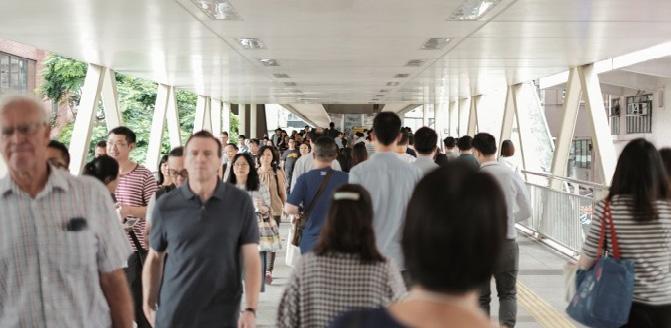
News from hongkongbusiness.hk
LEGAL INSURANCE MARKETS & INVESTING MARKETS & INVESTING LEGAL HR & EDUCATION

HONG KONG BUSINESS | Q2 2023 5
New policies position HK as leading centre for international dispute in APAC
Hong Kong and the Mainland’s closer ties had led the government to push for more policies that will position the city as a leading centre for international dispute in the Asia Pacific region.
Amongst these policies is the Mainland Judgments in Civil and Commercial Matters (Reciprocal Enforcement) Ordinance (MJREO), which got passed in December 2022.
Justin Tang, Partner, Dispute Resolution, at Linklaters, said the policy opens a new chapter |in reciprocal recognition in enforcement of civil and commercial judgments between the Mainland and Hong Kong.
“Once in effect, the MJREO will remove the requirement for an exclusive jurisdiction agreement before the parties may benefit from the Hong Kong and Mainland court’s reciprocal recognition of judgments arrangements,” Tang said.
“Mainland judgments, both monetary and non-monetary judgements that are civil and

commercial in nature, handed down on or after the commencement of MJREO could be recognised in Hong Kong, subject to an ‘excluded list’ such as personal bankruptcy and corporate insolvency matters, cases concerning succession and distribution of estate, family and matrimonial cases, and certain cases concerning intellectual property and maritime matters,” added Tang. In the same month, Hong Kong also lifted its ban on the outcome-related fee structures (ORFS) in arbitration and related proceedings.
Compared to Singapore and other top arbitral seats, Hong Kong’s proposed ORFS regime is broader because it permits the full range of ORFS structures, namely Conditional Fee Agreement (CFA), Damages Based Agreement (DBA), and the Hybrid DBA. Explaining the three
arrangements, Tang said: “Conditional fee agreements [is] where the client pays a success fee to the lawyer if the claim is successful; damages-based agreements [is] where the lawyer receives payment only if the client recovers a financial benefit in the matter and the payment is calculated by reference to the financial benefit obtained by the client; and hybrid damages-based agreements [is] where the lawyer receives fees for legal services, at a discounted rate, together with a contingency fee calculated by reference to the financial benefit obtained by the client if the client recovers a financial benefit in the matter,” Tang explained.

Since clients globally are “moving away from hourly rates and towards sharing risk with their advisers,” Kathryn Sanger, a partner at Herbert Smith Freehills and co-chair of the LRC’s sub-committee that proposed the ORFS changes, said establishment of the regime will attract more clients to have their case arbitrated in Hong Kong, and put the city on the same playing field as its competitors—London, New York, Mainland China, and Singapore—which are already allowing similar fee agreements.
Tang , for his part, said the framework “further expands the funding options available to parties to Hong Kong seated arbitrations, further enhancing the position of Hong Kong as an international commercial arbitration hub.”
AMLO
This year, amendments to the Anti-Money Laundering and Counter-Terrorist Financing Ordinance (AMLO) will take effect.
Shirley Au-yeung, Senior Associate, of Linklaters Hong Kong, said the amendments introduces a “new statutory regime for virtual asset service providers (VASP) in Hong Kong under which a person who seeks to carry on a virtual asset service business must obtain a VASP licence from the SFC.”
“Licensed VASPs will be subject to all AML/CTF requirements in AMLO that apply to regulated financial institutions such as customer due diligence and record-keeping requirements. The SFC will be vested with supervisory powers to enforce AML/CTF and other regulatory requirements on VASPs, including the power to investigate and impose disciplinary sanctions on VASP licensees,” Au-yeung said. “We envisage a proactive approach from the SFC on the supervision of and enforcement against VASP,” she added.
6 HONG KONG BUSINESS | Q2 2023 FIRST
Hong Kong also lifted its ban on the ORFS in arbitration and related proceedings
LEGAL
Once in effect, the MJREO will remove the requirement for an exclusive jurisdiction agreement






HONG KONG BUSINESS | Q2 2023 7
FOUR KEY ACTIONS FOR I&T GROWTH IN HONG KONG
Under the HK I&T Development Blueprint, the city plans to grow the industry by 5% in 5 years.
There are four key actions that Hong Kong could undertake to reach its targets under its I&T Development Blueprint, Colliers revealed.
The first step is to streamline procedures for the transformation of primitive land into I&T facilities, especially in the Northern Metropolis.
Dorothy Chow, Executive Director, Valuation & Advisory Services, Asia at Colliers Hong Kong, said seamless development-related statutory processes will fast track the supply pipeline. The second key action is to create a more proactive approach to land supply for I&T uses and related developments. The city needs to increase the supply of I&T property by twofold over the next few years to realise the development targets set out in the blueprint.
“Only about 3.3 million sq. ft. GFA of new I&T property is expected to come on stream in the next three to five years, which results in a shortage of over 5 million sq. ft,” said Dominic Chung, Executive Director, Asia, Capital Markets & Investment Services.
Policies and incentives
The third action, according to Bill Chan, Head of Industrial Services at Colliers Hong Kong, is the need for industry-protective measures, including a concessionary land price policy.
Chan said the government should refer to the terms and conditions for the sale and rental of I&T-allocated property in Singapore and Shenzhen as operational overhead is one of the key factors for I&T firms when deciding on a location.
The last and fourth strategy is Hong Kong should offer greater incentives to I&T talent and firms.
Experts assess the impact of AVD Scale 2 rates
REAL ESTATE
After more than a decade, the government has adjusted value bands of Scale 2 rates of the ad valorem stamp duty (AVD) payable for sale and purchase or transfer of both residential and nonresidential properties to ease the burden of firsttime home buyers.
One of the changes in the scale rates is that buyers will need to pay AVD of $100 for properties worth $3m, instead of $2m previously. The scale rates apply to transactions of both residential properties and nonresidential properties entered into at or after 11 a.m. on 22 February 2023.
Mayer Brown experts Eugene Y. C. Wong and Wayne K. W. Cheng believes the adjusted scale rates will effectively “lower the transaction costs associated with sale and purchase of small and medium residential and non-residential properties.”
“We believe it is likely that, as Hong Kong’s economy recovers from the pandemic, this measure will further boost the transaction count, particularly in small and medium residential units,” the Mayer Brown experts added.

Adjustments
Rosanna Tang, executive director, head of Research, Hong Kong of Cushman & Wakefield, had a similar sentiment, saying that broadine of the AVD Second Standard Rate bands will ease the burden on ordinary families and first-time buyers purchasing their first residential properties.

Whilst the adjustments does ease the burden of homebuyers, Hannah Jeong, head of Valuation & Advisory Services, Colliers Hong Kong, argued that it will have an “insignificant” impact on the price level of properties. adding that it will only result in less than 1% reduction in property value.



Rather than just adjusting the scale rate, Jeong believes it is time for the government to “ relax stamp duty on home purchases.”
“The special stamp duties launched were intended to curb speculation. However, the main factors affecting property prices are usually interest rates, local economy and citizens’ purchasing power. The current property prices have fallen by about 17% compared to the peak in 2021. Considering the high interest rates and the recovering domestic economy, we do not see the need to keep special stamp duties at this point in time,” Jeong said.
“We understand that the government cannot waive the special stamp duty all at once, but further relaxation can help attract more buyers into the market and stimulate the second-hand residential property market,” Jeong added.
A relaxation of buyer stamp duty will also have an overall positive impact on the property market and also complements the government’s talent acquisition scheme to increase Hong Kong’s attractiveness to foreign talent, said Jeong.
8 HONG KONG BUSINESS | Q2 2023 FIRST
Relaxation of buyer stamp duty will have an overall positive impact on the property market
I&T
This measure will boost the transaction count in small and medium units
Rosanna Tang
Hannah Jeong
Adjustments will have an insignificant impact on the price level of properties
HK risks narrowing fiscal buffers amidst ‘sizeable’ spending plan
Hong Kong will struggle to balance its budget as it launched a “sizeable” budget amidst a wide fiscal deficit, S&P reported. The Hong Kong government projected spending to exceed $760b and a deficit reaching $119b in the fiscal year ending in March 2024, which is wider than S&P forecasts.
“The government could take much longer to balance its budget, especially if it keeps rolling out support measures each year,” Rain Yin, S&P Global Ratings analyst, said. S&P noted the larger-than-expected 2022 and 2023 fiscal deficits, along with the higher recurring expenses
intended to stimulate the economy will likely weaken Hong Kong’s fiscal resources. “We estimate the government’s current liquid assets, which includes the fiscal reserves and bond fund assets, at more than 30% of GDP. Although this ratio has fallen substantially from 45% of GDP in 2019, this is still sufficient to withstand some fiscal deterioration in the next one to two years,” the report also read.
“If investments to improve productivity and boost potential growth bear fruit, this could restore the government’s fiscal health over the medium term and maintain support for the rating at the current level.” Days before the budget
was announced, Alice Leung, Tax Partner, KPMG China, said Hong Kong can narrow down its fiscal deficit with immediate measures such as the distribution of consumption vouchers.


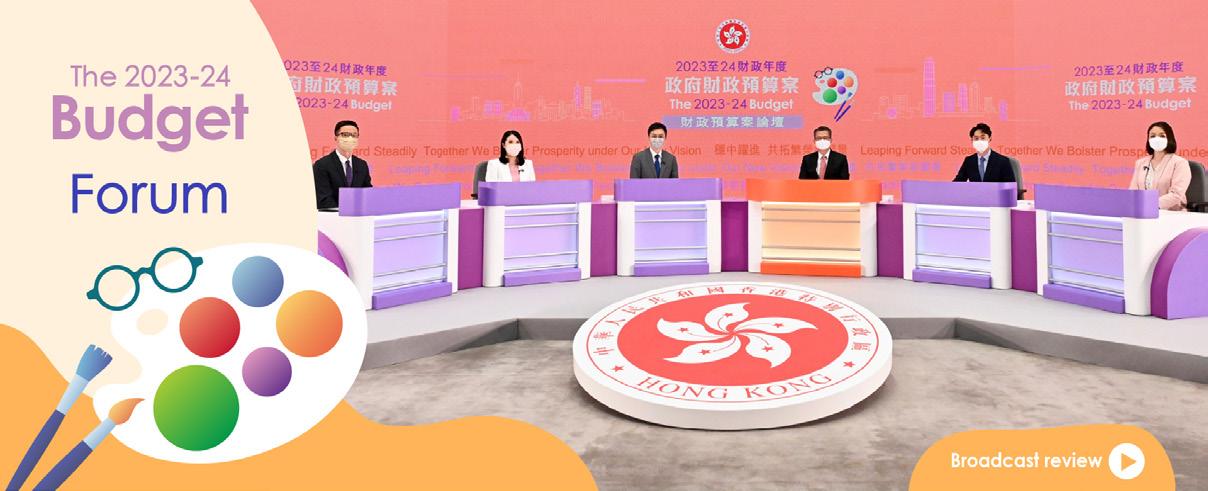
Aside from $5,000 worth of vouchers for permanent residents and new arrivals, Leung suggested the same could be distributed to permanent residents aged 70 or above. In addition, the government could also extend a monthly work allowance of $3,000 to newly employed tourism workers during 2023/24 over a three-month period, and the Tourism Industry Additional Support Scheme by providing each eligible licensed travel agent with a one-off cash subsidy. “In order to attract talent and support business growth, the government could introduce a tax concession where share-based remuneration offered by strategic enterprises to its Hong Kong employees would be exempt from Salaries Tax,” Leung said.
“Apart from this, the government could provide immigration incentives by shortening the number of years required to obtain a Hong Kong permanent residency from 7 years to 4 years for successful applicants/employees under Quality Migrant Admission Scheme, Top Talent Pass Scheme and certain tax incentives to make it more attractive and comprehensive,” she added.
THE CHARTIST: CREDIT AND CHARGE CARD PAYMENTS TO EXCEED $800B IN 2026
Hong Kong’s credit and charge card payments value is expected to reach $831.9b (US$106.7b) in 2026, according to GlobalData.

In a report, GlobalData said the market will likely grow at a compound annual growth rate (CAGR) of 3.9% between 2022–2026 given the “significant shift in consumer preferences towards non-cash payment methods and recovery in consumer spending. ”In 2020, credit and charge card payments declined by 17.1% due to a decline in consumer spending during the pandemic. The following year, the market saw a 15.4% growth, thanks to economic recovery and government initiatives.
This year, GlobalData forecast that credit and charge card payment value will register a 4.6% growth. “Credit and charge cards
are the most preferred payment cards in Hong Kong, accounting for 71% of total card payments by value in 2022. Government initiatives and opening of businesses have all increased consumer spending in Hong Kong, thereby benefiting its credit and charge card market,” Ravi Sharma, Lead Banking and Payments Analyst at GlobalData, commented.
Sharma added that Hong Kong has a card penetration of 2.7 cards per individual and a frequency of payments of 48.1.
The expert, however, warned that the market still faces several challenges, including global geopolitical risks and inflation.
Hong Kong’s inflation rate skyrocketed to 4.4% in September of 2022, and to tackle inflation, the central bank increased its benchmark interest rate to 4.75% in December 2022.
HONG KONG BUSINESS | Q2 2023 9 FIRST
ECONOMY
The gov’t projected a deficit reaching $119b in the fiscal year ending in March 2024 (Photo from https://www.budget.gov.hk/)
The gov’t could take much longer to balance its budget
Rain Yin
Alice Leung
Hong Kong: Credit and Charge Card Payments Value (HKD billion), 2018-26f
Source: GlobalData
Hong Kong set for strongest retail rebound as tourists flock back
Hong Kong SAR is amongst the top three preferred destinations of retailers planning a cross-border expansion in Asia Pacific, CBRE’s 2023 Asia Pacific Retail Flash Survey revealed.
“China and Hong Kong are forecasted to enjoy the strongest sales rebound after lifting pandemic-related measures. Retailers are positive yet believe the rebound is in sight but will happen gradually over a longer period,” Lawrence Wan, Senior Director, Head of Advisory & Transaction Services – Retail, CBRE Hong Kong, said.
Hong Kong will also see the strongest retail rental rebound amongst markets, according to the CBRE report.
“The return of Mainland China tourists to Hong Kong will give a strong boost to the sector. This is expected to drive leasing demand and rental growth, especially for tourist-oriented retailers,” Wan said.

According to CBRE, 72% of the retailers expect their sales to rise from 2022 and 71% intend to open new stores despite rising costs. It also reported that nearly half of retailers surveyed expect physical store footfall to return to pre-pandemic levels.
The report noted that, in particular, retailers prefer quality retail spaces in
shopping malls and along prime high streets. CBRE also believes that prime locations will outperform in 2023. They also have higher interests in secondary high streets (37% in 2023 vs 23% in 2021) due to their lower rents as compared to prime locations.
“As vacant units in prime locations are gradually absorbed and rents stabilise, some especially cost-sensitive retailers may seek opportunities to add new stores in secondary locations,” said Henry Chin, Head of Research, CBRE Asia Pacific.
Other locations which retailers prefer for their new physical stores include decentralised neighbourhoods and community malls (44%), transit hubs like metro or railway stations (28%), and outlets (18%). One factor that may slow retail expansion, however, is the rising cost of store-fit-outs. According to the survey, 60% of retailers said fit-out costs have risen by 10% from pre-pandemic levels.
“With the retail market yet to fully recover, most retailers are asking landlords to provide more incentives or other contributions to
offset growing fit-out costs,” said Chin.
Data from Cushman & Wakefield’s Asia Pacific Office Fit-out Cost Guide showed that the average office fit-out costs in Hong Kong was $1,081.61 or US$138.
Behind Hong Kong is Shenzhen with an average office fit-out price of $932.70 (US$119), Beijing with $917.02 (US$117), Guangzhou with $901.35 (US$115), and Shanghai with $839.51 (US$114).
Rising fit-out costs
In Asia Pacific, Hong Kong ranked fifth in terms of the priciest office fit-out markets. This also makes Hong Kong the most costly office fit-out markets in the Greater China region. In response to increasing fit-out costs, retailers (45%) plan to keep their budget unchanged in 2023. F&B retailers intend to cut fit-out budgets in 2023, whilst 36% of nonF&B retailers plan to spend more.
Most retailers (79%) also asked landlords for longer rent-free or fit-out periods in response to fluctuations in fit-out costs.
Others asked landlords to pay for store improvements (31%), looked for units with readily available fixtures and other equipment (24%), put upgrading or expansion plans on hold (16%), and cancelled leases (9%).
Other concerns of retailers which are hindering them to expand include the increase in production and labour costs (87%), labour shortages (67%) and the rising cost of running an online business (66%). Meanwhile, more than half (57%) of retailers are also cautious to expand because they plan to increase the footprint in existing markets.
“Although inflation in Asia Pacific is forecasted to ease in 2023, most retailers expect operational costs to continue to rise. Low unemployment will push up wage growth and production costs. For online retailers, the rising expense of new custom acquisition and logistics will erode margins,” Chin commented.
Marcos Chan, Executive Director, Head of Research, CBRE Hong Kong, added: “Hong Kong’s retail sector has experienced a downcycle since the pandemic. The overall vacancy of high-street shops remained high at 15.4% in December 2022.”
“While high-street shop rents have declined by over 40% since the commencement of the market downturn in mid-2019 and the current retail leasing market still favours tenants, retailers shall consider regaining their exposures and footprints in tourist hotspots and take advantage of the deeply discounted rents,” Chan added.
10 HONG KONG BUSINESS | Q2 2023 FIRST
Retailers believe the rebound is in sight but will happen gradually over a longer period (Photo by Tusginewko)
Hong Kong will see the strongest retail rental rebound amongst markets
RETAIL
Experts see slim chance of relaxing property cooling measures
The government did not make any adjustments on the cooling measures for the housing market, which has been subdued due to interest rates and weakening economy. In a statement, JLL said it may be an adequate time to adjust the market by loosening cooling measures.
“As the government has not relaxed measures in this situation, I believe there will be little chance of relaxation in the future,” Joseph Tsang, Chairman at JLL in Hong Kong, said. Kathy Lee, Head of Research at Colliers Hong Kong, said mass market home prices will not see a major recovery as there are no practical measures to support


its rebound. During the budget announcement, the government implemented adjustments on the stamp duty such as computation for the ad valorem stamp duty payable for selling, purchasing, and transferring residential and nonresidential properties.
This includes families allowed to buy a residential property worth $3m with stamp duty worth $100.
Rita Wong, Executive Director, Head of Valuation & Consulting, Valuation & Advisory Services, Greater China at CBRE, said the stamp duty was lowered but the overall policy remains unchanged.

“The transactions or transfers of residential and non-residential
properties will benefit from a lower ad valorem tax. This includes both small residential units and non-residential such as carparks transactions. It’s noteworthy that transactions of residential units below $3m only accounted for less than 5% of total transaction volume in 2022,” said Wong.

Tsang said only buyers who bought a flat worth below $10m will benefit from the stamp duty adjustments.
“However, they cannot save much. Currently many flats are selling for over$10m, and therefore, the policy on the housing market has little effect,” he added.
Housing supply
Whilst 105,000 units are expected to be available in the residential market for the next three to four years, Hannah Jeong, Head of Valuation & Advisory Services, in Colliers Hong Kong, said they fear that the failed residential and commercial land sales will affect land and housing supply. She further called on the government to address this land supply issue. “The government should improve valuation accuracy based on the latest market conditions and increase the attractiveness of sites using all means necessary to prevent consecutive failed sales, which would slow down land supply and hurt the overall development of Hong Kong,” she said.
THE CHARTIST: INTEREST FOR EV ADOPTION GROWING IN HONG KONG
Discussions on electric vehicle (EV) adoption has grown in Hong Kong over the past year, with 124 firms participating in such talks.
Data analytics company, GlobalData, said Hong Kong ranks third amongst Asia-Pacific markets which are actively showing interest towards the zero-emission vehicles and its related infrastructures.
Amongst Hong Kong companies who have taken part in the discussion was CLP Holdings.The company recently discussed a joint venture with the manufacturer of smart equipment Qingdao TGOOD Electric Company for launching electric vehicle charging networks.
“Amid the surging gas prices and energy shortages companies continue their efforts to enter the electric vehicles (EVs) market.
EV is considered the next big environment, social, and governance (ESG) investment,” GlobalData reported.
Also part of the top five markets for EV discussions were India (320), China (154), Australia (128), and Taiwan (99).
Region-wide, EV talks grew 28% yearon-year in 2022.

Misa Singh, Analyst at GlobalData, said discussions around EV-related infrastructure is also picking pace.
“Companies are concerned about the charging infrastructure. There is heavy investment in battery manufacturing as the demand for lithium-ion batteries is on the rise due to the growth in EVs. Furthermore, companies are looking forward to hydrogen fuel cell electric vehicles (HFCEV),” Singh said.
Companies’ Discussion on Electric Vehicles in APAC region: 2016 - 2022
Source: GlobalData
HONG KONG BUSINESS | Q2 2023 11 FIRST
REAL ESTATE
Only buyers who bought a flat worth below $10m will benefit from the stamp duty adjustments (Photo by Radu Micu on Flickr)
There will be little chance of relaxation in the future
Joseph Tsang
Kathy Lee
Rita Wong
Experts rally for change in legal industry’s traditional ‘billable system’
“A most-hours-wins system disproportionately disadvantages women partners,” reported UC Hastings.
Female lawyers with family responsibilities—those taking care of their kids or having just given birth— find it difficult to earn the same professional service fees as their male counterparts, creating a gap between genders in the field with twice as many women as men saying they are not able to progress their careers. This is why experts are calling for change in the legal industry’s traditional billable system where lawyers are paid by the amount of time they spend on various tasks, including research, document drafting, client meetings, and court appearances.
This concern was also echoed by Rutgers Center for Women and Work in a 2022 report, saying that “the current culture around compensation places too heavy weight on billable hours and origination credit in determining pay, and this culture needs to change.”
A report from UC Hastings College of the Law also stated that “a most-hours-wins system disproportionately disadvantages women partners.”
“Many more men than women have two person careers in which they can rely on their partner to take care of all matters outside of work,” the paper stated.
A joint report by Mayer Brown and Women In Law Hong Kong (WILHK) suggested a billable system of including work on diversity, equity, and inclusion (DEI) be recognised and rewarded to incentivise DEI involvement. In the same report, it was found that four in 10 (38.2%) female lawyers have felt left out of career-building opportunities because of their gender or care responsibilities.
Nisha Chugh, Head of Legal, Compliance & Company


Secretarial at ConnectedGroup, said law firms are looking beyond deliverables. “They are also looking at what other contributions women are making, rather than just focusing on billables,” ConnectedGroup’s expert said.
Change of mindset
Apart from a change in the billable system, a change of mindset is also needed to address gender disparity across industries, including the legal field.
“When someone who has a young kid or has a child, we tend to think that they would need more time off or they would need to be home more or take a step back in their career,” Hays expert, Adrian Lam, said.

“[But] having a child doesn’t [always] mean that [they] want to be more relaxed, it may just mean that [they] perhaps need to work a different set of hours. [They] might perhaps need to have that little bit more flexibility,” Lam added.
This is why Johnny Hui, Manager for Legal at Robert Walters Hong Kong, encourages firms to offer familyfriendly flexible work arrangements, such as parttime, telecommuting, or even job-sharing options, to accommodate the needs of female lawyers who may have family or caregiving responsibilities. Hui said firms can also offer flexible parental leave policies to allow women to take time off for childbirth and child-rearing without facing adverse consequences in their careers.


Doing more
Offering flexibility as well as changing the billable system are just few of the things that firms can do to ensure gender equality in the legal industry.
In Mayer Brown, new mothers who have come back to work are offered back-from-maternity-leave coaching.
“[We] coach them with a professional to help facilitate the transition and address issues such as work-life balance, boundary setting, and stress management,”
Amita Haylock, Co-Chair of Mayer Brown’s Women’s Network in Asia, shared. Haylock said the firm is also planning to provide training on confronting gender microaggressions, or the subtle or indirect comments or actions that can be interpreted as discriminatory or derogatory. These can be intentional or unintentional, and they can have a negative impact on the recipient’s well-being and sense of belonging in the workplace.
According to the joint report, 23.0% of women with senior roles in the legal industry had clients directing questions or queries to a more junior male colleague instead of them.
“We will talk about privileges and biases that are often the core of microaggressive behaviours, ways to interrupt microaggressions, and preventive measures to limit microaggressions and create a more inclusive work culture,” Haylock said. Ultimately, Chugh said there needs to be awareness and education amongst employees as to what counts as microaggression.
“With respect to microaggression, even if you have workplace policies against that, how do you enforce it? Because people may not even recognise that they’re doing something wrong, or that they may be hurting someone or making someone feel intimidated,” Chugh said.
“What is really important is educating and creating awareness within employees that [a certain] action is labelled as microaggression. There has to be education and awareness, before you implement the policy because policies don’t mean anything if people don’t understand them or are not accustomed to using them.”
12 HONG KONG BUSINESS | Q2 2023 HR BRIEFING
Firms are encouraged to offer family-friendly flexible work arrangements
Nisha Chugh
Johnny Hui
Adrian Lam
Amita Haylock

New ordinance slashes transaction costs for Hong Kong market makers
The government gazetted a bill waiving stamp duty payable on certain transactions relating to dual-counter stock.
Hong Kong’s stock market is set to see a boost in liquidity and reduced transaction costs for market makers engaged in dual-counter stock trading. This comes after the government passed a bill that waives the stamp duty on certain transactions related to dual-counter stocks. The move is expected to encourage more exchange participants to sign up for Hong Kong Exchanges and Clearing Limited’s (HKEX) Dual Counter Market Making Programme, leading to a more efficient and liquid market.
Minny Siu, Partner at King & Wood Mallesons, said market making activities include providing bid and ask quotes within a specified range of the latest market price in the Renminbi (RMB) counter for matching investors’ orders. Liquidity providing activities, on the other hand, include arbitrage trading, which involves taking advantage of price differences between two markets.



Before the changes to the Stamp Duty Ordinance were proposed, a stamp duty of 0.13% was levied on the value of transactions involving securities listed on the Stock Exchange of Hong Kong Limited. Additionally, the seller of each security had to pay a stamp duty of $5.00 for each instrument of transfer.
According to Pan Tsang, a Partner at Robertsons Hong Kong, these stamp duties accounted for a significant portion of the trading costs of securities transactions, comprising over 90% of the total cost. In other words, the stamp duty was a major expense for market participants and reducing or waiving it could significantly reduce transaction costs and promote more trading activity.
With the removal of stamp duty for a sale or purchase of dual-counter stock, Tsang and Siu believe more exchange participants (EPs) will sign up to be market makers under Hong Kong Exchanges and Clearing Limited’s (HKEX) Dual Counter Market Making Programme and engage in market making activities and arbitrage transactions.
When this happens, Siu said the price gap between the Hong Kong Dollar (HKD) counter and RMB counter will be minimised and promote liquidity of the latter.
RMB business hub status
Citing a working group formed by the HKEX, Hong Kong Monetary Authority (HKMA), and Securities and Futures Commission, Siu said RMB counters have “relatively low liquidity,” which resulted in a price difference between HKD and RMB counters of the same stock.
The price difference, in turn, caused a low market appetite for RMB counters generally.
“The stamp duty exemption will reduce the transaction costs of market makers and help increase the liquidity and price-efficiency of RMB securities,” Tsang said.
“It is anticipated that a surge in market appetite and liquidity of the RMB counter will promote the issuance and trading of RMB securities in Hong Kong,” Siu commented. This will foster the city’s position as the “leading offshore RMB business hub.”
“The increase in trading volume [of RMB securities in
Hong Kong] will promote the further development of the relevant financial infrastructure in Hong Kong and create synergies with other current RMB-related products, which in turn strengthens Hong Kong’s status as the world’s leading offshore RMB business hub,” Siu said.
Apart from market makers, Tsang said the stamp duty exemption will also benefit Hong Kong listed issuers.
“Under the Dual Counter Model, Hong Kong listed issuers will be able to apply to launch a new RMB counter so that investors can trade eligible RMB-denominated securities under the RMB counter,” Tsang said.
“HKEX and the Mainland authorities are exploring an initiative to expand the Stock Connect to allow Mainland investors to trade RMB-denominated securities through southbound Stock Connect such that listed issuers could potentially tap into additional capital from Mainland investors,” he added.

Siu said the DCMM Programme will support this initiative by the Mainland and Hong Kong.
Impact of RMB internationalisation
Ultimately, the bill will also enhance the internationalisation of RMB, said Verona Ho, Partner at Robertsons Hong Kong.
“If the RMB-denominated stock market can gradually flourish, and if foreign investors can purchase RMBdenominated stocks in addition to those from the Mainland, there will be an increase in the number of quality Mainland companies listed in Hong Kong,” Ho explained.
“When the Renminbi stock market in Hong Kong becomes active, these giant mainland stocks can be issued in Hong Kong at the same time, attracting international investment and speeding up the internationalisation of Renminbi,” Ho added.
RMB’s internationalisation, however, raises several questions, such as whether opening up RMB trading too much will weaken the HKD, or if the RMB capital pool can support the growing volume of RMB trading.
Ho also questioned whether the pricing power of the market value of stocks will shift from Hong Kong dollar investors to Renminbi investors after more Hong Kong stocks are denominated in Renminbi.
14 HONG KONG BUSINESS | Q2 2023 LEGAL BRIEFING
The move will encourage more participants to sign up for HKEX
A surge in market appetite will promote the issuance and trading of RMB securities (Photo by Mcy jerry)
Minny Siu
Pan Tsang
Verona Ho


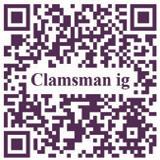


Three ways retailers can serve ‘budgeteers’
A budgeteer is someone who is not willing to spend more than necessary.
With inflationary pressures as a top concern, retailers are faced with a new challenge to adjust price strategies for customers who insist on value for money without sacrificing sustainability and quality. These consumers are called budgeteers, according to marketing firm Euromonitor International.
This type of customer is adopting a new spending behaviour called “sustainability by proxy,” which means choosing sustainable products that have minimal impact on the environment and opting for subscription-based models or repairing old items instead of buying new ones.
This trend is rapidly gaining popularity. Euromonitor identified in its study a gap between the majority of consumers (75%) not planning to increase spending and more than half of retailers (55%) looking to raise product price points to help their businesses survive.
Retailers, therefore, must meet budgeteers halfway. One way to do this is by giving a second life to a product that will help customers buy affordable items and be sustainable, according to Euromonitor International Research Consultant Sahiba Puri.

Rewards programmes
IKEA Thailand’s buyback and reselling service was developed in response to budgeteers’ behaviour. With millions of pre-owned furniture thrown in landfills, the furniture store is buying back used chairs, shelves, or chests of drawers from customers. In exchange for the used IKEA furniture, customers receive a gift card that allows them to buy new items in-store.
“In doing so, you’re offering your brand’s product at a more affordable price point so you’re already catering to a bigger audience. Second, you’re helping to extend the life of the product,” said Puri.
Ben Chien, AnyMind Managing Director in Greater China, said that sustainable supporters could advise people on how to keep preloved items last longer.

“There are affordable furniture stores that are very easy to build and use. But maybe their durability might not last as long. For example, some tables’ shelf life can last 20 years,’’ Chien, who oversees AnyMind’s Hong Kong, Taiwan, and Mainland China operations, told Hong Kong Business
Chien also suggested that brands can create a pre-owned programme that promotes second-hand products. One example is IKEA Singapore’s partnership with Carousell in April 2022, which extends the shelf life of its products through secondhand transactions or free-cycling on the Carousell marketplace. Customers then receive Carousell Protection vouchers or IKEA Family points.
As of 31 December 2022, an IKEA Singapore spokesperson told Hong Kong Business that over 6,754 IKEA family members and Carousell users participated in the rewards programme. IKEA furniture transactions grew by 30.5% since the programme began.
IKEA also said that buyers who might receive fake items or those unqualified for the listing can get a refund. The company aims to have 100% of all material sourced to be renewable or recycled by 2030.
Carousell, widely known as a secondhand marketplace, has been doing the preloved business since 2012. In 2021, it posted $49.5m in revenue and is focusing on being more profitable in the next three to four years.
Repairing and renting services
Consumers are also opting to repair their electronics instead of buying new ones, said Puri. In doing so, consumers may choose to rent or take subscription-based offers.
“This way, you’re providing a level of flexibility to your consumer segment where they do not have to make a big ticket purchase or commit to a big ticket item,” said Puri.
“At the same time, they can use it regularly by paying a monthly subscription. They can still own this product for whatever amount of time they need,” added Puri.
One example is Bundlee, a baby clothes rental service in the UK. It offers subscription services to help parents rent baby clothes at a low price. Parents can save over US$319 (EUR300) whilst paying only US$41.60 (EUR39) for the Bundlee subscription services.
Bundlee’s business model reduces 86% of carbon emissions and 96% of water usage compared to getting a new one at the store.
Balanced portfolio
Puri said even though budgeteers are on a tight budget, businesses do not necessarily need to trade off profitability in exchange for offering sustainable or second-hand products. Businesses can tap preloved items to keep their businesses afloat whilst retaining their core products.
“It’s about the portfolio of products that you offer and how you best decide on which portfolios need to be brand new versus where you can include second-hand products,” said Puri.
She also suggested tapping Buy Now, Pay Later, a growing payment scheme used for the underserved audience.
Chien said second-hand trade has existed for a long time but it has evolved due to the ease of selling a preloved item with just a snap of a photo and finding a community making the product more hip.
For the full story, go to https://hongkongbusiness.hk/

16 HONG KONG BUSINESS | Q2 2023 MARKETING
BRIEFING
Retailers must meet budgeteers halfway
Brands can create a pre-owned programme that promotes second-hand products
Sahiba Puri
Ben Chien



Tower 1, Enterprise Square 5, 38 Wang Chiu Road, Kowloon Bay
Address: 26/F,
Email: info@thedesk.com.hk
Sits above Kowloon Bay’s iconic MegaBox Offers flexible work and event spaces and essential business services theDesk’s new location at Enterprise Square 5 Grade A office tower overlooking amazing harbour views WhatsApp us to know more about the new location
Website: https://thedesk.com.hk
ANALYSIS: AUTOMATION
Consumers crave human connection amidst the era of automation

Businesses should balance AI and machine learning with personal care, says Euromonitor International.
Shoppers are attracted to e-commerce for its convenience and accessibility, but the lack of personal interaction that comes with traditional in-person shopping experiences can lead to a sense of disconnection and isolation. Euromonitor International has referred to this as “over-automation,” highlighting the potential negative impact of excessive automation on human connection.
In the time of ChatGPT and robotic baristas, salespersons remain valuable to some shoppers. This was highlighted by a 2023 Asia Pacific Retail Flash Survey conducted by CBRE, which found that 28% of consumers still visit physical stores to seek help from salespersons.
“Whilst automation is definitely about driving efficiencies, over-automation should be a genuine concern for businesses,” Euromonitor International Research Consultant Sahiba Puri told the Hong Kong Business

So, how can businesses bring in technology for seamless service and at the same time tap the human touch for customer experience?
To address these “opposing motivations,” Puri said businesses should learn authentic automation. This involves the purposeful application of technology in businesses.
When to automate
It is important for e-commerce platforms and retailers to find ways to offer personalised recommendations and chat support to help shoppers feel more engaged and connected with the products they are purchasing, Puri told the Hong Kong Business
Puri cited an example from the beauty shop, Lancôme, which launched a tech flagship in Singapore. The store provides consumers with personalised skin analysis from the brand’s skin tool and to balance it with human connection, they offer an in-person consultation with Lancôme experts. “In doing so the brand combined tech-driven skin
analysis with human expertise and curated a well-rounded customer experience,” said Puri. Another example is when scientists at Nanyang Technological University and Tan Tock Seng Hospital developed a prototype device designed to detect and prevent falls among the elderly population.
This is a mobile robotic balance assistant that enables seniors to have increased mobility whilst providing a high level of attention and swift response that may not be attainable by their human caretakers.
“As such, robotics that improves the quality of life and complements human expertise will be a competitive advantage moving forward,” Puri said.
For Ben Chien, AnyMind managing director of Greater China, brands in Hong Kong are having problems with “under customisation,” which means businesses are struggling to create new experiences with people going offline as well as online.

“How to sort of maximise this online back to offline experience through social and through video, this is very, very new, and does require a lot of customisation to different groups, different segments, user segments so I would imagine that no one is properly
equipped to have a full-army workout on this type of customised creative and custom content,”
Chien told Hong Kong Business.
Chien said under customisation may happen when retailers struggle with marketing campaigns for a product with two purposes. For example, developing a marketing strategy for gaming laptops that can be used as working laptops.
“Now you have a problem that you are selling one thing that provides two purposes to two completely separate groups… How do you sort of custom your creative assuming if you have the data? You still have to customise these very differently,” he said. Data from Euromonitor’s marketing trends for 2023 showed that 58% of consumers are comfortable talking to a human when addressing customer service issues. Only 19% said they interacted with an automated bot on a website.
Shorter attention span
Consumers also demand functionality and efficiency when shopping online. Puri said mindlessly browsing for hours makes consumers “unproductive and wasteful.”
With excessive use of social media, consumers now have reduced attention spans and an increased risk of mental health issues.
18 HONG KONG BUSINESS | Q2 2023
Over-automation should be a genuine concern for businesses
Over-automation can lead to a sense of disconnection and isolation
Ben Chien
Sahiba Puri
A Green Frontier at HKIS
By Kaitlin Shum ‘24, Hong Kong International
Asthe shadows of COVID-19 begin to lift, a new era is emerging for ‘ESG’, which stands for environment, social, and corporate governance. It is an acronym often used to summarise the 17 U.N. sustainable development goals which companies are now racing to implement into their operations. As part of Hong Kong International School’s (HKIS) dedication to ESG, the school has been busy planning a big sustainable development project since early 2022. Without giving too much away, it will include a fully functional greenhouse on campus, one of its kind amongst peers.
How HKIS brings sustainability goals to life

According to HKIS’s Director of Facilities Management, Raman Paravaikkarasu, this sustainable development project will move in three phases. The first phase encompasses massive data collection- converting numbers into emissions using a benchmark assessment. The assessment begins with an analysis of raw data from all divisions in the school, allowing the team to identify the average amount of carbon the school emits per day. The data collection process will accurately represent how much energy is spent, how much water is used, the amount of waste recycled, and much more. Raw data, also known as absolute numbers, is a term specific to ESG experts and is often challenging to translate to figures and quantities that a layman may understand. Through this assessment, absolute numbers can be reconfigured to data that the HKIS community and stakeholders may appreciate and use effectively to
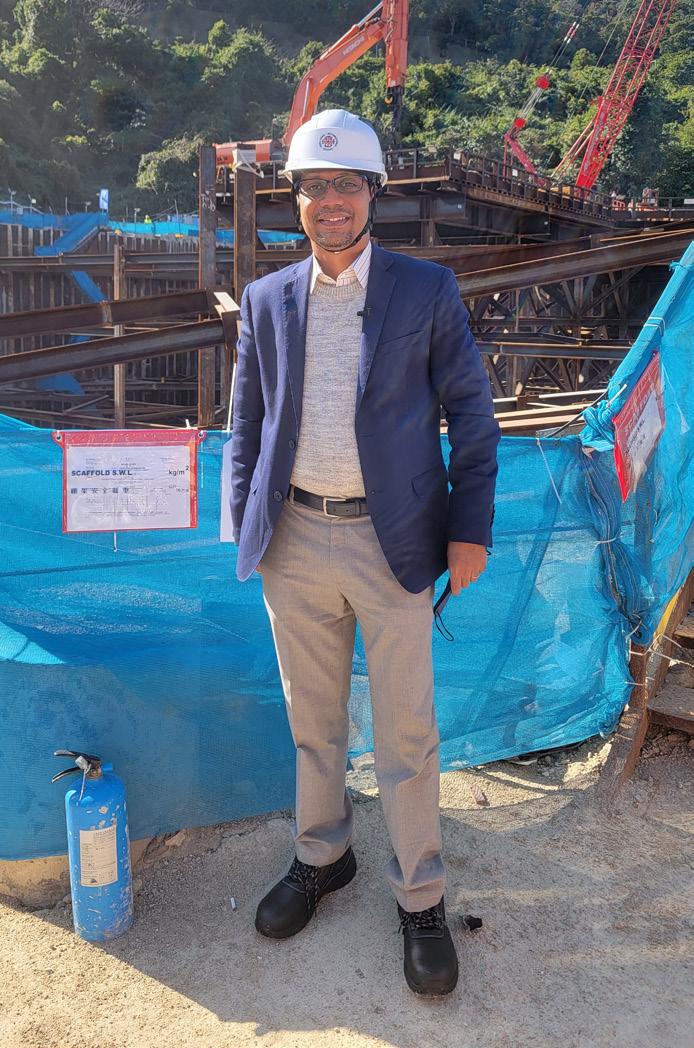
School
reduce their carbon footprint. This phase is critical; data must be accurate for the team to continue onto phase 2. Once the data is collected and the baseline benchmark identified, the team can project short- and long-term goals for the next few years. In phase 2, the team can work on bringing these goals to life by knowing what is achievable and what needs to be further improved. Paravaikkarasu emphasised that he is committed to seeing this project from start to finish. It is not just talking about what the school plans to do but implementing plans and holding the school accountable. Amongst the many proposals presented in phase 2, two specific initiatives will be implemented in phase 3 to make the school more energy efficient. The first is to enable current facilities to be used more efficiently, specifically, managing the air conditioning system in each room at the school, and the second is to introduce new sources of energyone of which are solar panels.
The future for HKIS
Solar energy is known to be the most abundant and long-lasting energy source in the world. It is also one of the most accessible renewable energy sources compared to other environmentally harmful sources, such as fossil fuels. That is why HKIS will invest in installing solar panels as part of phase 3. HKIS
believes that, in the long run, harnessing solar energy will benefit the school economically and be a driving force in its commitment to social and educational impact. It has commissioned HK Electric to begin the installation process in 2023 in nearly all its facilities, starting with the residences at the Repulse Bay Campus. Notably, a television monitor will also be installed in addition to the solar panels, enabling faculty, students, as well as the community members to visualise and track the energy collected by the solar panels on a day-to-day basis.
Why HKIS values sustainability
The school has chosen to include the school community as a whole in its ESG initiative and, in doing so, to educate and inspire students first-hand. It is not just the faculty and administration officers being involved in the process, but also having student participation through organisations such as Green Dragons and the Sustainability Board in high school that makes this a team effort from all stakeholders. As Paravaikkarasu said, “This process is both top-down and bottom-up. It is important to infuse a greater understanding to the community and the team so they can all contribute.” Most importantly, “It is all part of the ethos in being future leaders for the school; to get everyone involved and ensure they are on the right track for the future.”
HONG KONG BUSINESS | Q2 2023 19
EDUCATION 2022
The school has chosen to include the school community as a whole in its ESG initiative and, in doing so, to educate and inspire students first-hand
Sustainability in practice
Raman Paravaikkarasu, Director of Facilities Management, HKIS
DBS’ Lareina Wang on why role models matter to women in banking
Only 20% of bankers in C-Suite and senior leadership roles in Hong Kong are women.
Women’s representation in banks has come a long way, but much work still needs to be done. In a report, Deloitte noted that barely two in 10 C-suite and senior leadership roles in Hong Kong are occupied by women, at 17.9% and 23.9%, respectively. This is below the already dismal global averages of 21% and 19% for each; and the share is not expected to change through 2030.
Having women in senior leadership positions is important to foster more women to enter the financial industry, a reality echoed by Lareina Wang, ED, head of digital & innovation, Institutional Banking Group of DBS Bank Hong Kong.
“I have been fortunate enough to have had many female senior leaders that I look up to and learn from, they all have different backgrounds, different styles and different personal life setups, which is brilliant because that sends a strong message that success comes in many different formats and shapes,” Wang told Hong Kong Business
Wang makes it a point that this applies not just to women, but to any underrepresented groups– be it different ethnic groups, neuro groups or LGBTQ groups.
“We need to be mindful that all of us have [an] unconscious bias, [and] it’s important to acknowledge that and educate ourselves so we can overcome them. Resist the urge to box anyone in any stereotypes, be empathetic and if you are fortunate enough to be in a decision-making position, be extra generous with the opportunities you could give to under-represented groups,” Wang said, noting women, introverts, people who are non-native English speakers amongst the underrepresented.
In celebration of International Women’s Day, Hong Kong Business spoke with Wang to learn more about the challenges still being faced by women in the industry–and what Wang and DBS are doing in order to help them thrive in the banking sector.

What are the current concerns and challenges faced by women in the banking industry?
Regardless of geo-locations, the challenges have always been: one, the lack of representation at senior levels, which means the collective female voices are not as loud as their male counterparts, and also means younger women have fewer role models to look up to and be inspired by.
Second [is] the conscious and unconscious biases that form unnecessary stereotypes—for example, people tend to associate tech roles with males, and as a result, fewer females choose to enter this field and the vicious cycle continues.
Over time, as awareness and efforts in this area grow, both these areas have seen big improvements, however, the challenges are still very prevalent today.
Resist the urge to box anyone in any stereotypes
Your career in banking and finance has spanned different continents–from Europe to Asia. Could you tell us about how you began your career in the banking industry?
I’m a marketeer by training and only stumbled into the world of “digital” with Ogilvy London because there weren’t that many roles around in the depth of the financial crisis. At that time, digital marketing was only just emerging and I was fortunate enough to catch that trend and see my career progression accelerate as “digital” became more and more mainstream. As head of Digital, I see myself as a business leader rather than a tech leader, because digital is at the core of how DBS operates, and as customers become more and more digitally savvy, digital is increasingly becoming our competitive advantage to attract and engage with our clients.
Are there differences in the needs and challenges faced by women in Asia compared to Europe?
I definitely see more senior female leaders in Hong Kong than in London, and I think it has a lot to do with the “support network” women have here, be it the easily accessible paid-for help or help from family.
This is not the case for London as childcare or elderly care are extortionately expensive, and culturally families are not as involved to provide care. As a result, mothers often face a tough choice of whether to return to work after childbirth, particularly after multiple children—the childcare cost will very likely outweigh the mother’s income and because of that a lot of new mums choose to either delay the return to the workforce or only doing it on a part-time basis. Needless to say, this has a knock-on impact on these mothers’ career development in the long run.
20 HONG KONG BUSINESS | Q2 2023 INTERVIEW
Women in senior positions can foster more women to enter the financial industry (Photo: Lareina Wang, ED, DBS)




WINNER BEST HOME THEATER
Jumppoint offers AI-driven courier routing to
deliver to underserved markets
Algorithm helps the Hong Kong-based startup predict demand per area to ensure efficient drops at low cost.

efficient logistics platform,” said Ho.
The idea that Jumppoint, since it is fictional, also breaks all the modern physics rules also reflects Ho’s company. “It is also how Jumppoint works. We break most of the rules and we want to provide a revolutionary product to the world,” said Ho.
When they were starting, Ho admitted that Jumppoint encountered some bumps on the road, particularly in keeping up with the shifts in delivery demand during COVID-19.
“The biggest challenge is always about the strong fluctuation in demand in COVID. The demand can ramp up 10 times in one day, and then drop 10 times in the next week,” Ho recalled.
As companies are busy doing what their competitors are also doing, Hong Kong-based startup Jumppoint does the opposite. Unlike other logistics platforms that offer quantity upon delivery, Jumppoint CEO and founder Samson Ho said they do it differently by using algorithms of their AI tech to plan the routes of their couriers.
What sets Jumppoint apart is that it also offers services to the “underserved market” in Hong Kong, which Ho identified as markets supplying bulky deliveries and multi-temperature items such as cold chain delivery.
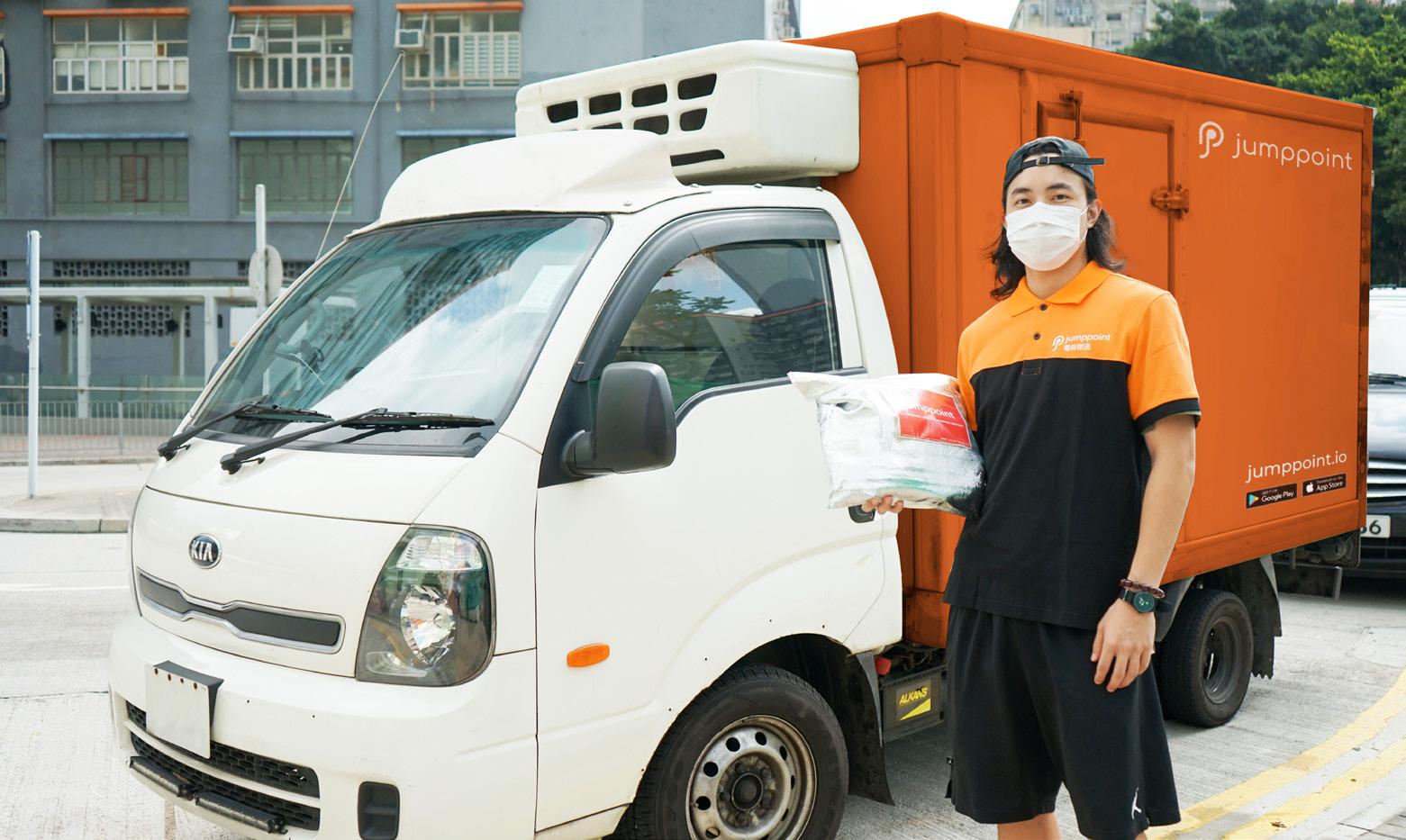
Its cold-chain delivery offers four temperature ranges, which are: -18°C to -12°C; 0°C to 4°C; 19°C to 25°C, and room temperature.
“When there is competition, your product is the same as ours, and you are stuck to something that will fail. When we see a certain demand is not well served by others, we focus on that,” Ho told Hong Kong Business
Since Jumppoint allows drivers to deliver more than 50 items per route, the logistics cost can be decreased by maximising the number of deliveries per hour. For example, Ho said their drivers can deliver four orders per hour which translates to $45 (US$5.85) delivery costs.
Unlike other logistics platforms, one product being delivered in an hour usually costs an average delivery fee of $180 (about US$23).
These solutions are powered by proprietary AI tools of Jumppoint called Atlax and Hermex to assist them in creating unified GeoCode address databases and multi-level dynamic routing systems.
Jumppoint’s logistics services also enjoy a “100% acceptance rate” because they bank on historical data to predict the demand in each area. This helps them plan their supply for deliveries.
“We understand who our merchants are, and how their business looks at different times of the week of the month so that we can plan our supply beforehand,” said Ho.
Origin story
In the science fiction universe, jump points are portals used to travel from one galaxy or universe to another. Ho’s team was inspired by this science fiction term and used it for their platform’s name.
“The meaning behind Jumppoint is we want to make it the most efficient way for you to travel in the world to deliver a product to another part of the world. We want to be the most
Compared to transportation firms, e-commerce demand or logistics isn’t as steady. Ho said demand for e-commerce is high when there are mega sales such as Black Friday.
‘Blue ocean’
Five years from now, Ho said they would continue to focus on improving the situation of the underserved market, which is door-to-door delivery at low cost.
“This is still a blue ocean, the first strong growing market. We will focus on that but of course, when everyone is doing that, we have to create new value,” said Ho.
When other logistics companies focus on making their packaging stunning and tap other marketing strategies, Jumppoint takes a different direction by ensuring its retention rates for clients are higher than 90%.
“We do not rely on marketing expenses and we do not rely on advertising. We only focus on creating value and differentiated value for our customers,” he said.
Jumppoint’s lead investor and earliest supporter are MindWorks Ventures. Other investors include Headline Asia, a Japanese venture capital firm, Beyond Ventures, Hong Kong Inno Capital, Chinachem Group, and HKSAR ITVF.
The logistics startup has so far raised more than $78m (US$10m), Ho said.
22 HONG KONG BUSINESS | Q2 2023 STARTUP
Jumppoint serves markets supplying bulky deliveries and multi-temperature items (Photo courtesy of Jumppoint)
When we see a certain demand is not well served by others, we focus on that
Samson Ho










HONG KONG BUSINESS | Q2 2023 23 Work across Hong Kong with theDesk Causeway Bay Sheung Wan Kowloon Bay Admiralty Sai Wan Kwun Tong Find your own working space at our locations https://thedesk.com.hk/ Central Tsim Sha Tsui Sha Tin
CONCEPT WATCH
Eatology cooks up a ‘halfway diet’ for Hong Kongers

The flexitarian meal plan is for consumers looking to reduce their consumption of animal-based products.
Eatology started offering Hong Kongers science-backed meal plans in 2015, seeing the need for a more practical and sustainable diet that works well with customers’ lifestyles. It has since launched meal plans for vegetarians, vegans, and even pescetarians, but Eatology saw that not everyone can make the full move to becoming a vegetarian; hence, it curated a new meal plan.
Through a flexitarian meal plan, Eatology hopes that consumers looking to change their diets can consume more greens without ditching meat. Flexitarians are also occasionally known as flexible vegetarians or casual vegetarians.

“The flexitarian diet is sustainable for people to eat every day. We already have a vegetarian diet, in place for a long time, but some people are not ready to make the full move—that’s why we created a way to bring something in between that is easier to follow,”
Christophe Daures told Hong Kong Business. Citing a Temasek report, Eatology said that flexitarians made up 42% of the global market in 2021 with a quarter of Southeast Asians and Australians saying that they eat less meat now compared to three years ago.

Daures co-founded Eatology with Guillaume Kaminer. Eatology’s target market comprises men and women between the ages of 25 and 65, but mostly, its clients are busy young individuals who want to save time and start a healthy lifestyle.

More greens, less meat
Through the flexitarian meal plan, Eatology sought to encourage Hong Kongers to cut their consumption of meat or fish to once a day as an initial step toward improving their health.
“People tend to overeat protein these days because they read in magazines that they should eat lots of protein because they’re
The flexitarian diet is sustainable for people to eat every day
going to lose muscles, which is not true,” Daures shared. “[The meal plan] helps to reduce the amount of protein that you are absolving, and this is the correct amount that you should get which is a number between 18% and 25%.”
Approximately 90% of the meals also offer unrefined carbohydrates, such as brown rice, and wheat flour. These are harder to break down, compared to white rice, making the body feel full for a longer time.
The flexitarian diet also allows consumers to improve their gut health, which Daures considered critical in any diet.
“Gut health is something that very few people talk about today that is extremely important for the benefit of your body,” he said. “If your gut is not in good health, you can try to have a good diet, but it’s not going to work.”
On top of its health benefits, Eatology also said that the flexitarian meal plan ultimately helps in reducing consumers’ carbon footprint. A study by the United Nations Food and Agricultural Organisation cited that about 14% of all greenhouse gas emissions come from meat and dairy production. For the full story, go to https:// hongkongbusiness.hk/
24 HONG KONG BUSINESS | Q2 2023
Eatology encourages Hong Kongers to cut their consumption of meat or fish to once a day
Buddha Bowl with Green Curry and Plant-Based Chicken
Pork Loin Duros Iberico, Sichuan Garlic Sauce, Asian Sautéed Spinach
Eatology founders Guillaume Kaminer and Christophe Daures
Better Industry Opportunities as Usage of Healthcare Devices Rises
According to a report published by KPMG in March 2020 which builds on figures released by Fitch Solutions, Malaysia’s medical device market is forecasted to be worth RM8.97b (US$2b) in 2022, with a compound annual growth rate (CAGR) of 7.5% between 2018 and 2022. This comes alongside the revelation that total healthcare expenditure in Malaysia will exceed RM69.2b in 2021 and is expected to grow at a CAGR of 7.6% through 2025.
Malaysia’s medical device industry comprises over 200 manufacturers, half of which are involved in producing medicalgrade gloves. The industry also produces higher value-added and high-technology products including blood glucose monitors, orthopaedic implants, pacemakers, stents, electro-medical devices and monitoring devices.

In-Vitro Diagnostic Rapid Test Kits
In-vitro diagnostic (IVD) tests are defined as tests performed on bodily samples commonly obtained through swabs of mucus from inside the nose or at the back of the throat or through blood obtained from a vein or fingerstick. IVD tests look to detect diseases present in the human body, which can be used to monitor an individual’s health and assist in diagnosing ailments. The size of the IVD market stood at US$83.4b in 2020 and is expected to grow at a CAGR of 4.5% from 2021 to 2027. This is due to an increase in the use of IVDs in COVID-19-related diagnostics and it is also expected to rise due to increased awareness of early healthcare detection and treatment.
IVD Rapid Test Kits (RTKs), such as lateral
flow tests, allow for quick results while being easily accessible due to their smaller size as compared to bulky and complex laboratory-grade equipment used for highly-sensitive diagnostic testing.
Demand for RTKs saw significant prominence during the COVID-19 pandemic due to its preliminary sensitivity and accuracy, quick-yielding results, relatively inexpensive cost and ability to scale up for mass production. COVID-19 RTKs are one of the latest entries to the long list of IVD RTKs, which have been in use way before the COVID-19 pandemic.
As awareness for early diagnosis and treatment increases, there is a need for IVD tests to be more sensitive and have an expanded scope of testing coverage while simultaneously also providing quicker test turnover rates with high accuracy. This would mean higher development costs and longer project timelines but would also ensure an overall increase in the standards and accessibility of healthcare, especially given the effort to miniaturise IVD tests into smaller, portable RTKs.
With advanced biomarker detection technologies, stricter regulations and quality standards, healthcare users can be assured that the results from these tests are reliable and trustworthy. In addition, more and more tests are being made available to assist in the detection of a growing list of health issues and complications.
In Malaysia, more than five (5) companies produce In-Vitro Diagnostic RTKs, with most of them beginning production over the past two years in a bid to cater to the overwhelming demand for COVID-19 rapid detection. As COVID-19 has not shown any
signs of waning, the domestic production of COVID-19 RTKs remains to be seen as essential, and testing needs continue to be indispensable. Having already developed an ecosystem for producing IVD RTKs, Malaysia is also primed to take advantage of the growing awareness of healthcare and the demand for early diagnostics. Local manufacturers of these diagnostic test kits can retool and accommodate a diversified range of products, with some already actively involved in the production of test kits to detect HIV, malaria, influenza, and pregnancy.
Moving Forward
As the country advances, Malaysia can position itself as one of the manufacturing champions of these next-generation diagnostics devices, in line with the national aspiration of becoming the regional medical devices manufacturing hub that caters for the global market. This is made possible with greenfield Foreign Direct Investments (FDI) and strategic collaborations with local partners, which would develop this niche manufacturing area further.
The local industry also stands a chance of being part of this new development through the supply of diagnostic kit components, whereby local manufacturers already have experience producing IVD test kits for Enzyme-Linked Immunosorbent Assay (ELISA) and RT-PCR tests.
The world-class Electronics Manufacturing and Support Services (EMS / ESS) sectors in Malaysia also boost the local manufacturing of next-generation IVD devices, which can leverage heavily from local experience and expertise in developing and manufacturing complex electronics-based components for such devices.
Investors who are intent on exploring the business prospects of this new growth area can get in touch with MIDA’s Life Sciences and Medical Technology Division for more information.
HONG KONG BUSINESS | Q2 2023 25
Increasing adoption of IVD kits bodes well for Malaysia.
COMPANY FEATURE
MBA competes with specialised postgrad programmes through AI
Providers now offer blockchain, ESG investing, and double degree programmes.
programmes are competitive as they can “better prepare students in advancing to top management roles,” Leung maintained.
As opposed to online courses, Leung said MBA offers experiential learning such as in-person networking events or professional development opportunities that online programmes do not have. In addition, PolyU’s MBA programme includes advanced technological elements in its curriculum such as blockchain, cloud computing, data science, and AI.
AI in the mix
Sachin Tipnis, senior executive director of HKU Business School, said one of the challenges they have to face is ChatGPT, the well-known AI chatbot that has garnered a mixed reception since its launch.

Master of Business Administration
(MBA) providers are facing increased competition with specialised postgraduate programmes and online courses. From 2020 to 2021, the trend was online MBA; and in 2022, providers were challenged to integrate specialised courses and AI to hone the skills of future business leaders.
Despite facing increased competition, MBA providers were able to overcome the challenges as reflected in this year’s Hong Kong Business’ MBA rankings, which saw an overall increase of 24% in the total number of students enrolled in the participating schools—from 1,090 in 2021 to 1,354 in 2022.
In the rankings, Hong Kong University (HKU) MBA remains the titleholder for the largest MBA programme, with 465 students enrolled in 2022 compared with 315 students in 2021.
Next in rank are the Chinese University of Hong Kong (CUHK) MBA in Finance at second and CUHK MBA at third with 317 and 166 enrolled students, respectively.
The new addition, Hong Kong Baptist University MBA takes fourth place with 121 enrolled students in 2022, followed by CityU MBA with 115 students in 2022 from 110 students in 2021.

Education advancements
In Hong Kong, MBA competes with more specialised taught postgraduate programmes, such as Masters in Finance or Business Analytics, Fine Leung, MBA programme director at The Hong Kong Polytechnic University (PolyU), told Hong Kong Business “Students might feel that they can get immediate benefits from these specialised postgraduate programmes in their career,” Leung said. “Some of these programmes also have lower bars in terms of admission requirements. For example, some of them don’t require work experience,” added Leung.
Another factor to be acknowledged is the emergence of online programmes and other online course providers such as Coursera.
But in comparison to specialised postgraduate programmes, the MBA
He admitted that this development is still being studied but highlighted that they are willing to adapt to changes in technology by carefully studying it.
“Because [ChatGPT] challenges the way probably the assignments are done and maybe the examinations are done. The information is easily available now so this is something which we need to work with,” Tipnis told Hong Kong Business.

“But my general thought process is that we need to embrace technology because it’s very important to work within this premise otherwise, we cannot evolve,” added Tipnis.
Dual courses and ‘real exposure’ Professor Wan Wongsunwai, associate dean of MBA programmes at CUHK, said their provider is not only the oldest school in the market and the first to offer an MBA degree in Hong Kong and the region, but also offers dual MBA and Juris Doctor opportunities as well as other flexible and exclusive double degree opportunities. “We have several students every year taking MBA JD, either in this order or the reverse. We have all these different
26 HONG KONG BUSINESS | Q2 2023
Hong Kong Baptist University is the newest addition to Hong Kong Business’ latest MBA rankings (Photo from the HKBU website)
MBA PROGRAMMES SURVEY
Some of these programmes have lower bars in terms of admission requirements
Fine Leung
Sachin Tipnis
and flexible options available to students,” said Wongsunwai.
Another MBA option is the MBA Plus scheme which allows students to register in another master’s programme at CUHK Business School immediately after completing an MBA. “We have introduced the [MBA Plus scheme] to meet job recruiter’s expectations about specialised knowledge. This makes it possible for MBA students to supplement their MBA education by signing up or enrolling in a master’s in finance, accounting, marketing, business analytics, information and technology management, etc. thus earning two degrees whilst benefiting from substantial savings in both time and money,” said Wongsunwai.
Tipnis said they opened centres in Tel Aviv, Israel, Ho Chi Minh City, Vietnam, and Beijing and Shenzhen to give students “real exposure” to knowledge and developments in these areas. For example, Israel’s status as the hub for startups is linked to top-level technology. This strategy stemmed from the changing demand for new jobs in the market.
“In terms of the kind of workshops we are putting in place, we realised the importance of soft skills but it has even got more enhanced in the market. That’s why we had to put in more resources to ensure that our students get the best results for enhancing their soft skills,” HKU’s Tipnis said.
Quality comes with a price
Education is not immune to inflation, so providers had to raise their minimum fees to elevate teaching staff and research capabilities. In CUHK, pursuing excellent teachers
MBA PROGRAMMES SURVEY
China reopening effect China loosening its restrictions may benefit business schools in Hong Kong, especially in drawing in alumni. For PolyU’s Leung and CUHK’s Wongsunwai, they foresee the number of applications from China for MBA enrollment picking up.

Leung said Hong Kong’s status as an international financial hub and its government support for new domains such as Web3 applications and financial technology will attract people, not just from China, to study in the market.
and boosting research comes with a cost. Although their minimum fees stayed the same for CUHK MBA, which is still at $560,000 (about US$4.4m).
“None of these things come cheap. Having excellent teachers is constantly having the ability to continuously keep on the leading edge of knowledge creation, and knowledge dissemination,” Wongsunwai stressed.
It is noteworthy that CUHK still offers scholarships and tuition assistance programmes to mitigate cost pressures for those who lack financial resources.
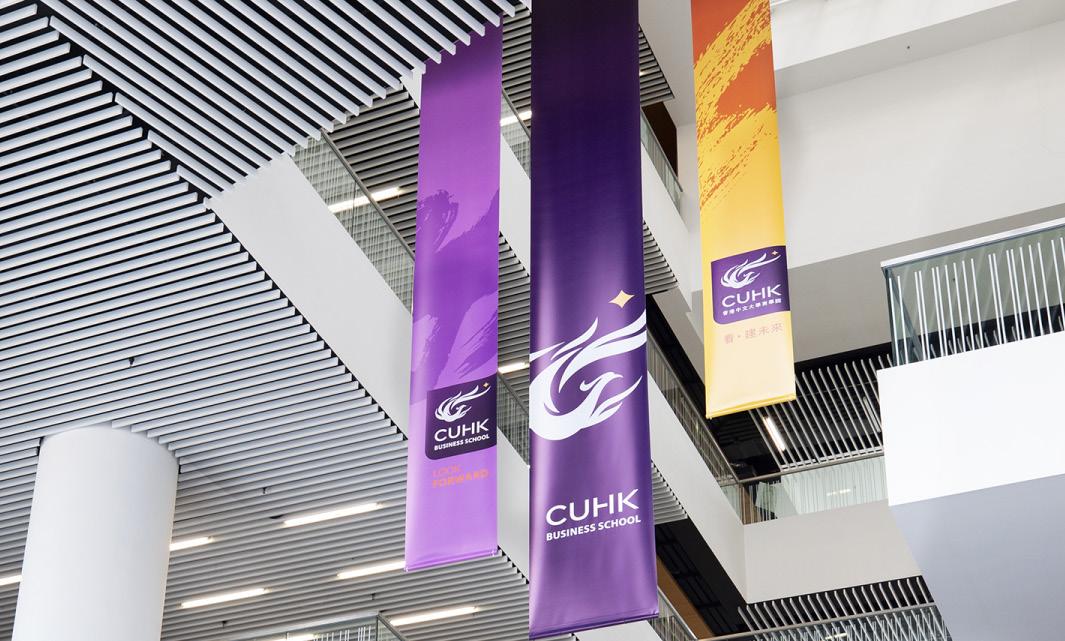
“We also try to understand the applicant’s motivation and try to see if we as a programme indeed can help them in their aspirations. If we find that there is a good fit and we can certainly do good to society by providing these good and excellent applicants with the right educational training,” said Wongsunwai.
PolyU’s Leung said the cost of attracting high-calibre faculty in MBA education is increasing. The school’s administrative costs for updating curriculum and offering diverse enrichment experiences also raised student fees.
HKU’s Tipnis said they mitigate inflationary pressures by negotiating with coaching firms and moving some of their resources online.
“A lot of tech had to be bought for classrooms and classrooms had to be upgraded so it did require a certain cost, but we were able to manage it well. We are not hit too much by what’s happening in terms of the inflation and the cost as such,” HKU’s Tipnis said.
None of these things come cheap
For HKU’s Tipnis, the number of applications may increase but not dramatically. Hong Kong, though, has always been a comfortable location for mainland Chinese.
During the COVID-19 pandemic, students located in China were allowed to take online courses from foreign universities. However, in late January 2023, the Chinese Ministry of Education announced that it would no longer recognise overseas degrees obtained through online learning. CUHK’s Wongsunwai said the rule does not affect them as their default teaching mode has always been in-person to provide the optimal experiential learning experience. With these challenges, Hong Kong’s MBA schools allow their curriculum to evolve to ensure their students are up to speed with the latest employment demands.

HONG KONG BUSINESS | Q2 2023 27
Wan Wongsunwai
The Chinese University of Hong Kong has 3 MBA programmes in this year’s list (Photo from the CUHK website)
The Chinese Ministry of Education announced that it would no longer recognise overseas degrees obtained through online learning
MBA PROGRAMMES SURVEY
Disclaimer: The following MBA programmes have opted out of the rankings for the purposes of this report: HKUST MBA, HKUST EMBA, Kellogg HKUST Executive MBA Programme, and Essex Online MBA. The data on the number of MBA students enrolled in 2022 was obtained from the MBA providers’ respective data. The purpose of this disclaimer is to inform readers of the programmes that are not included in the rankings.
28 HONG KONG BUSINESS | Q2 2023
MBA PROGRAMME PROVIDER/LOCAL PARTNER Total Number of Students HEAD OF HONG KONG OFFICE/DEAN 2021 2022 HKU MBA Faculty of Business and Economics, HKU 315 465 Prof. Hongbin Cai (Dean) CUHK MBA in Finance The Chinese University of Hong Kong 324 325 Prof. Ming Liu (Head of Programme) CUHK MBA The Chinese University of Hong Kong 163 161 Prof. Wan Wongsunwai (Head of Programme) HKBU MBA Hong Kong Baptist University - 121 Dr. Shui Ki WAN (Head of Programme) CityU MBA City University of Hong Kong 110 115 Prof. Kevin Chiang (MBA Programme Director) CUHK Executive MBA The Chinese University of Hong Kong 93 89 Prof. Howard Lam (Head of Programme) PolyU MBA The Hong Kong Polytechnic University 85 63 Ir Prof. T.C. Edwin Cheng (Dean) Dr Fine Fanni LEUNG (MBA Programme Director) University of Liverpool Kaplan Higher Education N/A 15 N/A TOTAL 1090 1354
MBA PROGRAMMES SURVEY
HONG KONG BUSINESS | Q2 2023 29 TOTAL NUMBER OF STUDENTS Minimum Cost (SG$) Duration Number of Intakes Per Year Full Time Part Time Full Time Part Time Full Time Part Time 45 420 HK$588,000 HK$510,000 1 year 2 to 4 years 1 N/A 317 N/A HK$508,039 or RMB438,000 NA 24 months 1 47 114 HK$560,000 HK$435,000 12 or 16 months 24 months 1 N/A 121 N/A HK$340,000 N/A 24 months 1 65 50 HK$416,000 HK$376,000 12 or 18 months; 24 or 36 months 1 N/A 89 N/A HK$640,000 tuition plus HK$26,000 residence fee for 2021 intake N/A 24 months 1 25 38 "HK$437,190 per programme (HK$11,210 per credit) for 2023/24 intake " HK$437,190 per programme (HK$11,210 per credit) for 2023/24 intake 1 year 2 years 1 N/A 15 N/A HK$198,000 (£21,000) N/A 30 months 4 182 1164
Funding shifts to deep tech industry as generative AI drives investments
Experts believe new startups will build their business models on AI

been a ballooning number of “green” startups attempting to plug gaps in the environmental, social, and corporate governance (ESG) domain.
“[Startups] are capitalising on the regulatory ambitions of developed countries and countries with large carbon footprints,” said Moh.
One of the companies featured in this year’s list that focuses on sustainability is PackMojo. In 2023, Tan believes that climate-tech and sustainability-related startups will “likely gain some traction as companies and governments all over the world double down on their sustainability efforts.”
Back in 2014, businesses focused on logistics tech and e-commerce were not as big, but when Ninja Van entered the picture, the startup scene saw a rise of entrepreneurs gravitating towards the sector. The same phenomenon will likely happen again in the current startup economy, but this time with deep tech—technologies requiring substantial investment in research and development.
In an interview with Hong Kong Business, Bennett Lee, Investment Director of Velocity Ventures, said there are going to be a “lot of new startups building upon the technologies of artificial intelligence (AI) and ChatGPT.”

Jeffrey Chi, Vice Chairman for Asia at Vickers Venture Partners, also believes that deep tech is set to flourish, especially since the sector already saw growth in 2022.

Raymond Moh, Senior Adviser to Cambridge Advisers Pte Ltd, had a similar observation, saying that many of the emerging startups are developing disruptive applications in the Web 3.0 space. “This includes deep learning applications to enhance the productivity of traditional processes and generate insights from untapped data that are
conventionally stored in archives; blockchain applications to provide decentralised solutions to the traditional finance processes, and others create a whole new digital ecosystem and user experience in gaming and metaverse platforms; Internet of Things (IoT) applications in both household and commercial uses to provide convenience and enhance the longevity of high-value assets, respectively,” Moh said.
Vickers Venture Partners is particularly looking for startups with innovative technologies in expanding fields such as biotech or healthcare, AI, advanced materials, robotics, photonics, and quantum computing.
Whilst deep tech has become somewhat popular amongst entrepreneurs and investors, Tan Shuo Yan, Deloitte Southeast Asia’s Innovation Senior Manager, said the industry is currently underinvested in. “These technical industries will constitute the backbone of the next frontier of innovation in Southeast Asia, but there are still significant existing gaps in each industry to be bridged,” Tan said.
Going green
Apart from deep tech startups, Moh said that over the past year, there has
Chi said startups with technologies associated with renewable energy are becoming increasingly interesting and attractive. Vickers Venture Partners is interested in grid-level energy storage and geothermal innovations.
“One of the key issues with renewable energy sources such as solar and wind is its reliance on weather conditions. Efficient energy storage and geothermal solve those problems and provide for stable and dependent energy supply. These are game changers in the renewable energy world,” Chi said.
“As countries in the region continue to develop, there is increasing demand for electricity and a need to reduce carbon emissions. Geothermal energy can play a significant role in meeting these goals, and venture capitalists see the potential for strong returns on their investments. In addition, governments in Asia are also making efforts to increase their geothermal power generation capacity by providing incentives and subsidies to companies and investors who develop geothermal power projects,” Chi added. Lee said startups must also focus on the “governance” side of ESG since there is a lot to be done in this aspect, considering the downfall of several big startups like FTX, Theranos, and Zilingo.
HOTTEST STARTUPS 2023 30 HONG KONG BUSINESS | Q2 2023
generator apps.
The deep tech industry is currently underinvested in
Many emerging startups are developing disruptive applications in the Web 3.0 space
Bennett Lee
Jeffrey Chi
Healthcare remains a hit
According to Moh, many of the innovations from healthcare startups are targeting front-end applications, such as AI for medicine, and relatively less on the supporting infrastructures such as regulatory compliance support.

“The area of regulatory support across…[the] medical sector is still lacking in terms of innovation and sophistication… Medical innovations such as biotechnology and cell gene therapies are also not keeping pace with the evolving needs of an ageing population. These require deep expertise that crosses multiple disciplines, heavy but patient capital, and longer gestation periods. Black swan events like the COVID-19 pandemic have raised the importance of new discoveries in defensive medicine,” Moh said.
“Deep tech startups who are committed to plunging in for the long term can leverage on their advanced technologies and partner with medical professionals to shorten the development lifecycle, with the aim to create profound impacts to treatment and medicine discovery,” he added.
Tan, for his part, said entrepreneurs should tap into innovations such as non-intrusive sensors, wearables, and diagnostics.
Whilst healthcare remained popular in 2022, Lee believes the sector will see a slowdown in the coming years, particularly on the telemedicine front. He added that telemedicine’s pace of growth during the pandemic is “not going to be sustainable.” During the pandemic, telemedicine startups grew 400% to 500% year-on-year. Lee expects this growth to come down to a 150% to 200% range.
Fintech, still a frontrunner
Like healthcare, fintech remains at the forefront of the startup economy. In 2023, experts believe the sector will continue to grow.
Adjacent fintech verticals, like credit scoring, buy-now-pay-later (BNPL), and earned wage access (EWA) will continue to grow as well, said Tan. The crypto-blockchain space, however, will likely hit a slump, according to Lee, adding that there’s a lot of risk at the moment with regard to crypto.


With the FTX collapse and regulations becoming stricter, Lee said startups will have a harder time entering the space.
On the brighter side, Lee believes there will be new innovative companies coming out of crypto which can use the technology more soundly. Fintech also has a lot of scope for investment and innovation, particularly in areas such as digital banking, said Chi. But since traditional financial institutions like large banks are also “adopting their solutions very quickly,” Chi said fintech startups will find the “space challenging and highly competitive, and in all likelihood, find it difficult to sustain their business on their own.”
As funding levels decrease in the current economic climate, entrepreneurs should stress-test their value proposition and refine their go-to-market plans, sharpen their go-to-market plans, and brutally cut excessive expenditures, according to Lee.
“This year, it’s all about execution, talking about profitability and talking about what makes your business model viable. If you could do that, that would obviously attract investors’ attention,” Lee said.
For Chi, the key to attracting inventors is to focus on “profitability and demonstrating a clear path to revenue growth.”
“In times of economic uncertainty, investors are often more cautious about investing in high-risk startups,” he said. “Be transparent with your potential investors about the risks and challenges your business may face. Investors appreciate honesty and want to know that you have a clear understanding of the obstacles your business may encounter,” added Chi.
Tan, for his part, advised enterprises to create “painkiller products that solve core pain points, as opposed to vitamin solutions that are good to have.”
“[Venture Capitalists (VCs)] are looking for capital-efficient profitable startups that offer indispensable products and/or services. During tough times, people tend to cut back on discretionary products and focus on necessities. Startups that provide a tool, platform, or service that people and businesses need have better chances to raise capital.” Tan said.
Tan added that VCs will also be looking at startups that are capitalefficient and have a clear path to profitability. “This means startups should avoid capital-intensive business strategies, such as expensive customer acquisition strategies, owning significant amounts of assets, and employing large numbers of talent. They will be held to even higher expectations of demonstrating potential for profitability, whether that be in healthy margins, or tapping on network effects to grow exponentially,” he added.
Disruptions
Entrepreneurs should continuously shape, or even pivot, their business model so that it can withstand disruption by market forces, said Moh. “Investors generally have turned to be more cautious in measuring valuation and take longer time to select their perceived market segment leaders. Therefore, entrepreneurs may want to negotiate for larger investment size and face more dilution to buy time amid a gloomy climate,” Moh said. For products that require a long gestation period but can really make a significant impact, [entrepreneurs] should not be deterred by the short-term view of venture capital firms who have targets and fund life limitations. They potentially can look out for the more ‘patient capital’ offered by family offices in Asia. The latter are looking for ventures that are aligned to the family’s mission
HOTTEST STARTUPS 2023 HONG KONG BUSINESS | Q2 2023 31
This year, it’s all about execution
Raymond Moh
Tan Shuo Yan
Startups are developing deep learning applications to enhance the productivity of traditional processes
and can make a good impact on the society, and less so on significant returns,” Moh added.
Pushing Hong Kong as a startup hub
Whilst Hong Kong has fallen in the rankings of top startup economies in Asia-Pacific, Chi believes it can rise anew with four steps.
“First, it could increase its investment in innovation by providing funding for research and development and promoting collaboration between universities and businesses. Second, it could streamline its regulatory environment by removing barriers to entry and reducing bureaucracy. Third, it could attract and retain top talent by offering attractive salaries, providing training opportunities, and offering a high quality of life for its citizens,” Chi said.
“Finally, Hong Kong could work to build a more diverse economy, reducing its reliance on financial
services and creating opportunities for startups in a variety of industries. By taking these steps, Hong Kong could attract more startups, foster innovation, and establish itself as a leading startup hub in the region,” Chi added. Recently, there have been audit work paper inspections occurring in Hong Kong which, in turn, has affected investment activity in the city. “The inspections, which are being conducted by the city’s accounting regulator, the Financial Reporting Council (FRC), have resulted in delays in the release of audited financial statements for many companies, including startups. This has led to a slowdown in investment activity, as investors are hesitant to commit funds without access to up-to-date financial information. The inspections have also resulted in increased scrutiny of accounting practices, which may lead to greater caution amongst investors and
Hong Kong could work to build a more diverse economy
a more risk-averse approach to funding,” Chi said.

The impact of the inspections on funding in the city, however, will depend on several factors moving forward.
“If the inspections result in a greater focus on transparency and accountability amongst companies, this could ultimately lead to increased investor confidence and a more stable investment environment,” Chi said.
“If the inspections continue to lead to delays and uncertainty, this could lead to a further slowdown in investment activity and a loss of confidence amongst investors. Ultimately, the impact of the inspections on VC funding in Hong Kong will depend on how effectively the FRC is able to balance its oversight responsibilities with the need to maintain a vibrant and dynamic startup ecosystem in the city,” Chi added.
Over the past years, many startups struggled to get funded as venture capital firms became more careful about deals they enter into due to macroeconomic headwinds. Hong Kong Business’s 10 hottest startups of 2023 showcases ventures that have successfully secured funding in the past 12 to 24 months despite the challenging private capital market, as well as startups that were able to grow their enterpise amidst the restrictive business environment in the city. This year’s startups are backed by top venture capital firms such as Brinc, Betatron, and MindWorks Capital. All startups featured on the list are five years and under, as of the publication date. They are arranged by founding year, from oldest to newest.
Founders: Gary Walters & Rachel Cheuk
Funding: US$240,000
Start of operations: 2017
The comprehensive real estate analytics platform aims to simplify the process of sourcing information necessary to complete a project in the industry by providing high-quality and detailed sales comps, lease comps, and property information across 68+ cities in Asia. One of its solutions, Realinflo Floor allows brokers, surveyors and researchers in Asia to access hard to obtain office, retail and industrial lease comps for free. The startup’s founder, Gary Walter, has been in the real estate industry for over 14 years and has worked with big names such as Swire Properties and Colliers International. One of Realinflo’s investors, Betatron said it invested in the startup given the transparency the platform brings to an opaque real estate industry with many siloed and unstructured data sets.
Founders: Wendy Chan & Vincent Choi
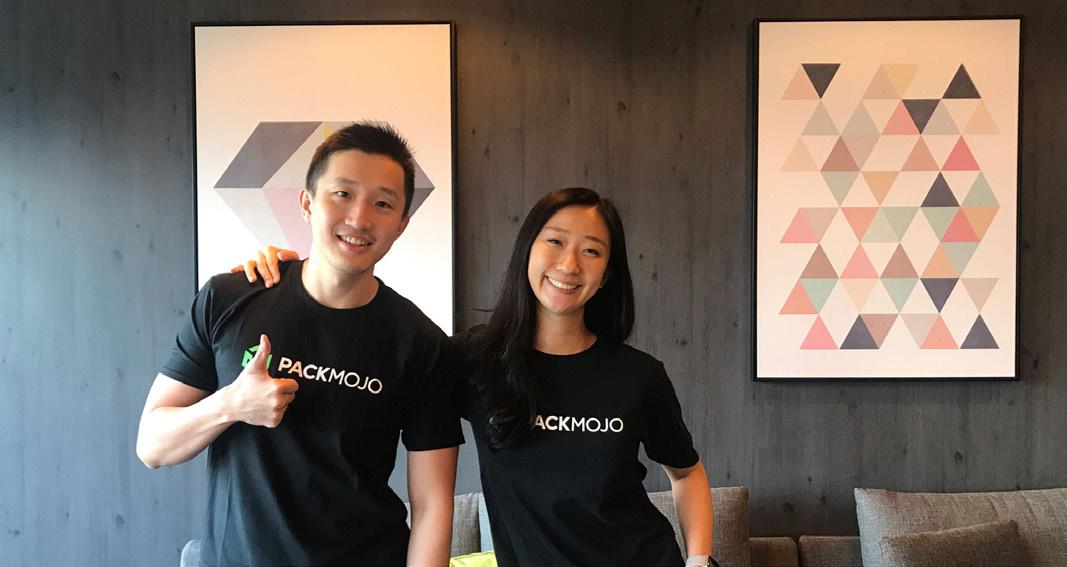

Funding: US$600,000
Start of operations: 2018
PackMojo helps e-commerce businesses save time and money by simplifying their packaging procurement process. Through PackMojo’s packaging automation platform, merchants can customise box sizes and design, configure carrier rates, and create orders quickly and accurately from one central dashboard. With a strong belief that packaging should be sustainable, PackMojo uses paper and cardboard that contains at least 50% post-consumer content, and soy-based ink for printing. To add, the startup also plants one tree every 200 boxes it produces. One of PackMojo’s investors, Betatron, said it invested in the startup because of its team’s dedication to offering flexible and cost-effective packaging solutions to the growing number of e-commerce businesses.
HOTTEST STARTUPS 2023 32 HONG KONG BUSINESS | Q2 2023
1. RealInflo
2. PackMojo
Founders: Eric Lai


Funding: US$1M
Start of operations: 2018
Eric Lai created booking platform Flow because of his frustration over having to pay for a full-night stay in hotels, but only staying in the room for less than five hours, during his short business trips. He wanted travellers to book stays with flexibility. Through Flow, customers can book a hotel stay for a minimum of two hours and check in anytime. Most of the bookings in Flow are 3-5 star hotels and “instant,” so users can book on the same day before their desired check-in time. The platform also benefits its hotel partners in a way that they can resell empty times during the daytime after a guest checks out. “You can think of us as the Booking.com for half-day hotels. You choose a hotel, choose a duration, and choose a check-in time,” Lai said.
Founders: Ken Chu, CEO & Co-Founder & Leo Wong, COO & Co-Founder
Funding: US$5M
Start of operations: 2019
In a bid to avoid “miscommunication” in business that run on multiple platforms, Ken Chu created chat management platform, imBee. What imBee does is consolidate different messaging channels into one single inbox, allowing multiple teams to access client information in one platform. The platform integrates more than 300 applications including, Salesforce, HubSpot, and Shopify. Apart from integration, the platform also has productivity and analytic tools which can help top management oversee their business performance. DCM, one of imBee’s partners, said it foresees the startup “taking centre stage for business and customer chat management within the tech world in the coming years.”
Founders: Henson Tsai

Funding: US$8M
Start of operations: 2019
E-commerce platform SleekFlow allows its partner sellers to directly collect payments through chat, which, in turn, allows them to easily convert their prospective customers into paying customers. Amongst platforms where SleekFlow allows a one-click checkout include WhatsApp, Instagram, Facebook, Telegram, Viber, and WeChat. Founder Henson Tsai said he plans to make his solution available in platforms such as iMessage and Tiktok. Gobi Partners, one of the startup’s partners, said the firm was impressed by SleekFlow’s “vision and ability to execute.” “We’re thrilled to support such a talented and driven team as they tap into the immense opportunity of the burgeoning social commerce market,” Cindy Zhang, executive director of Gobi Partners.
Founders: Samson Ho
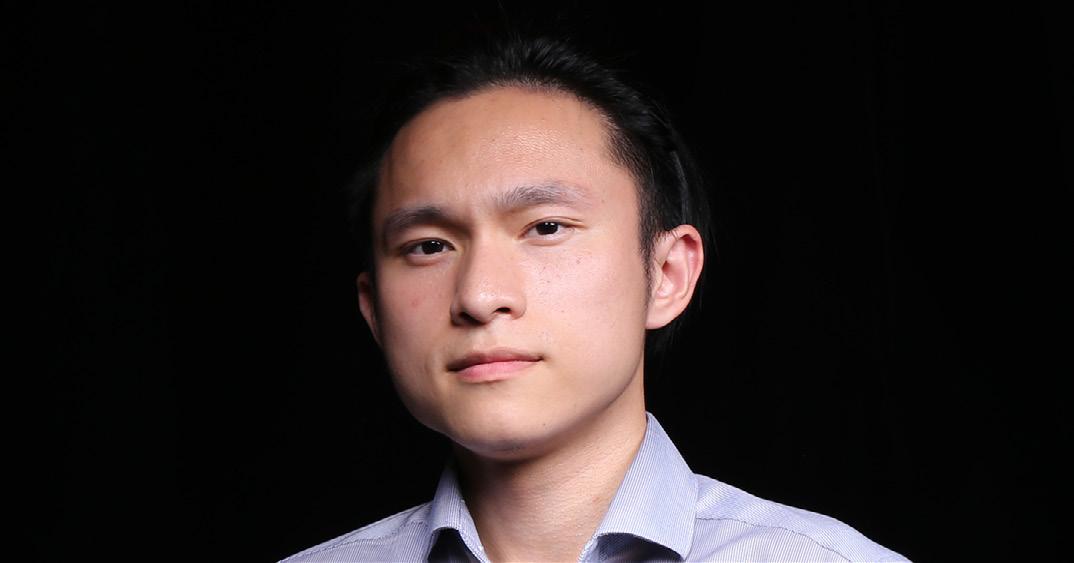

Funding: US$6.5M
Start of operations: 2020
Inspired by the Marvel Cinematic Universe, Samson Ho named his logistics and delivery platform, Jumppoint. “The meaning behind Jumppoint is we want to make it the most efficient way for you to travel in the world to deliver a product to another part of the world. We want to be the most efficient logistics platform,” Ho told Hong Kong Business. Unlike its competitors, Jumppoint also offers logistics services to “underserved markets’’ or those supplying bulky deliveries and multi-temperature items such as cold chain delivery. Its cold-chain delivery offers four temperature ranges which are -18 to -12°C; 0 to 4°C; 19 to 25°C and room temperature. MindWorks Capital, one of Jumppoint’s backers, said it invested in the startup due to its “excellent timing and a first-mover advantage,” amongst others.
HOTTEST STARTUPS 2023 HONG KONG BUSINESS | Q2 2023 33
3. Flow
4. imBee Limited
5. SleekFlow
6. Jumppoint
7. Bilby AI
Founders: Ryan Manuel
Funding: US$1.6M
Start of operations: 2021
The Brinc-backed startup allows businesses to take advantage of changes in a country’s regulations by making these policies “testable, predictable, and available as an Application Programming Interface (API). The machine learning and AI-powered tool helps firms benefit from changes to policies and regulations by taking publicly available information on a country’s regulatory changes and encoding it into an open, structured, accessible, and testable system. Bilby AI’s first use case is China whose regulations move markets. Other services which Bilby AI offers include predictive insights that can help improve portfolio management, trading performance, and pricing of risks, financial services, and products. The startup aims to roll out its Vietnam, Korea, Indonesia, and Japan software in roughly three-month intervals.
Founders: Chris Tsun, Alex Tsun, Chanut Sriphyak

Funding: US$2.95M
Start of operations: 2021
Chanut, Alex, and Chris founded Sky Meta with the aim of developing NFT tools that make the transition to Web3 seamless for users. Their product suite spans across several industries with the goal of accelerating Web3 adoption by integrating consumer experiences seamlessly. Early on, they launched an NFT management and leasing portal, alongside a gamer platform to help Web3 games attract and retain gamers, as well as manage their NFTs. Their latest tool, GENU.N, enables brands to combat counterfeiting by providing customers with a way to authenticate products using NFCs and NFTs. Additionally, GENU.N offers brands an opportunity to transition users into Web3 through a user-friendly interface. GENU.N is currently in the process of integrating with a famous fashion brand and a toy company.
Founders: Marco Staglianò
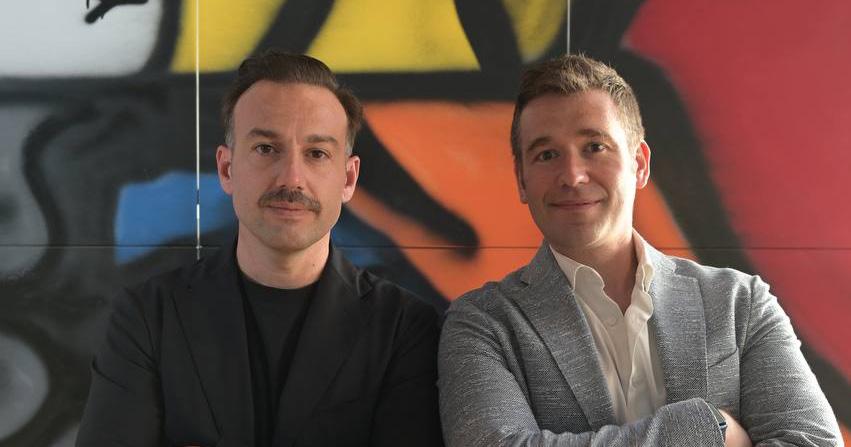

Funding: US$3.5m
Start of operations: 2021
Another-1’s goal is to merge the physical and digital modern luxury worlds and democratise the creation and trading process of hype goods. To do so, the startup allows its users to build, collect, stake, and trade metaverse-ready digital fashion backed by NFC-authenticated physical goods in its Web3 fashion platform built on Polygon. The startup is led by Marco Staglianò, who is founder and CEO, and Francesco Sorrentino who serves as creative director. whilst Brinc, one of the startup’s partners, described Another-1 as “an on-chain, secured one-stop shop for hype beasts, designers, brands, and resellers that repurposes fashion products via NFTs for metaverse interoperability. In the first half of 2022, the startup raised US$3M; of which, US$2.5m was from a token private sale, and US$1M was from an equity capital raise. In the first of 2023, Another-1 plans to raise its pre-A round.
Founders: Suda Jiang

Funding: Angel Round
Start of operations: 2022
Kola Labs is on a mission to establish a global presence as the go-to provider of dynamic and interactive sound experiences in Web3. The startup also aims to be the pioneer in the music PFP space, saying that audio is the missing piece in digital identity evolution. What it does is help musicians and creators establish their identity, prove ownership and authorship of their music, and monetise their work using decentralised identifiers (DIDs) and web3 technologies. Kola Labs is also developing new and entertaining utilities of web3 music, such as creating soundtracks for the Metaverse or developing new forms of interactive audio experiences that leverage the capabilities of decentralised technologies. Brinc, one of Kola Labs’ partners, believes the startup will “attract a lot of attention due to all the trends surrounding AI-generated content and user-generated content.”
34 HONG KONG BUSINESS | Q2 2023 HOTTEST STARTUPS 2023
8. Sky Meta
9. Another-1
10. Kola Labs
Discover 20,000 Fine Wines De ivere o o r oor

Authentic wines. Best prices. Free shipping.

China's trusted content-driven, cross-border fine wine marketplace.



FINANCIAL INSIGHT: VENTURE CAPITAL
VC-entrepreneur ‘stand-off’ decreases funding volume
VC investment remains tight, dropping to $22.6b.
During the last few months of 2022, venture capital funding fell to levels not seen since 2017. Whilst macroeconomic headwinds played a role in this drop, experts point to the ‘stand-off’ between the investors and the investees as the main reason for the decline.
As unicorns struggle to justify billion-dollar valuations on a fundamental basis, investors are pushing for lower valuations, whilst startups continue to hold out for higher ones. The mismatch in expectations has led to an impasse, resulting in a decline in transaction volumes and creating uncertainty in the venture capital market, Andrew Thompson, Partner, Head of Private Equity at KPMG Asia Pacific, told Hong Kong Business.
“Buyers don’t believe the valuations or they prefer lower valuations. The buyers believe that the valuations have fallen, [but sellers] are still pushing for higher valuations,” Thompson added.
Bennett Lee, Investment Director of Velocity Ventures, said both

sides of the camp—investors and startups—have not adjusted their expectations, thus the occurrence of the standoff. “We, VCs, see the implication very quickly from the public markets, number one, but also, from our limited partners (LPs) and our extended investor network, who are managing monies. We see the implication coming very fast, and we are planning for the aftereffects of it,” Lee said.
“That’s why we are advising startups to be more reasonable and more realistic with valuations. We’re also sharing that the funding conditions going forward will be tougher. I think startups have not felt it yet directly… Eventually, there’ll be an equilibrium,” Lee added.
In the fourth quarter of 2022, VC investment funding dropped to US $22.6b across 2,157 deals.
Thompson said the venture capital and private markets are generally undergoing a quieter period compared to 2021 also due to price changes in the market. Thompson noted that there had been price falls in the private market due to
macroeconomic factors, whilst less transparent than the price changes in the public market.
“This whole series of macroeconomic impacts started to affect the global capital markets. The public markets were down very significantly during 2022,” he said.
“Now, that uncertainty just spills into the private capital markets. I think the VC market was particularly vulnerable because you’ve come off this period of really quite exuberant growth,” he added.
Ben Balzer, Partner at Bain & Company, had a similar sentiment, saying that “correction in public markets has important implications on portfolio company valuations and new deals.”
“We saw a strong public market correction from the end of 2021 onwards with the S&P 500 down ~25% at times during 2022. This correction has been more pronounced in the Nasdaq 100 Tech index with a drop of close to 50% at its peak draw-down. VC investments have been heavily skewed towards the tech sector in recent years,” Balzer told Hong Kong Business.
“There was a significant number of VC investments that were made at high valuations, underwriting very aggressive plans during 2020 and 2021. Similar to high-profile public market companies that have seen valuations drop by, in some cases, well above 75%, VC portfolios will also have to take a hit. The extent of this is still unclear but as this plays out, this will have important implications for how aggressive future investments will be,” Balzer added.
Thompson explained that as prices readjust to the geopolitical and economic and inflationary risk environment, traditional metrics such as revenue and profitability become “much more relevant” to venture capital firms.

Funding decline
Meanwhile, businesses, especially those who got funded quite easily two years ago, would simply not get funded at dramatically lower valuations, or what the industry calls a “down round,” a situation where a company raises new funds at a lower valuation than its previous round of funding, resulting in a decrease in the
36 HONG KONG BUSINESS | Q2 2023
We are advising startups to be more reasonable and more realistic with valuations
Andrew Thompson
Both investors and startups have not adjusted their expectations, thus the stand-off
value of existing shares.
The mismatch in valuations has led to an impasse between “buyers” or the VCs and the “sellers” or the enterprises which in turn affected the transaction volumes in 2022.

Thompson, however, underscored that the funding decline is not necessarily a bad thing.
“It’s just that prices are readjusting to reality, which in public markets tends to happen very quickly, but in private markets a bit slower,” he said.
More VC activity in 2023
In the first six to nine months of 2023, Thompson expects the VC market to be in a lull, with investments coming in at a slower pace.
“You’ve got the speculative type money that is largely departed and is properly less likely to reappear and then you also have what we call the core VC community being a bit more careful about the deals, focusing more on certain business plans and waiting for better valuations,” Thompson said, adding that the first half of the year will continue to be an adjustment period for the market.
With the global fund-raising environment being significantly tighter, Balzer said new funds or less differentiated funds with an average track record will also find it harder to raise. Moving forward, however, Thompson believes that there will be plenty of VC activity going forward.
“Historically, in private markets, the best time to invest or what we call ‘vintages’ tend to be exactly in
FINANCIAL INSIGHT: VENTURE CAPITAL
push investments during the year is a wider stabilising of the macro environment with lower or stable inflation and more stability on interest rates,” said Balzer.

this sort of period or the next couple of years when prices have fallen a bit lower… In fact, the best vintage in the last 25 years in private capital was 2009, following the global financial crisis,” the KPMG expert said.

“Once the investors believe that valuations have fallen to an appropriate level, you will start seeing a lot more activity ” he added.
The increase in VC activity will be seen across Asia, said Thompson.

Balzer, for his part, said China’s reopening is another “strong positive” for the region given the “sheer scale of investment” going to the country.
Balzer said China’s closure has limited deal-making activity in Asia in 2022, with Greater China VC investment dropping by 45% relative to 2021. What could also
Across verticals, Thompson expects funding to pour into artificial intelligence. “We’ve all heard of the rise of the ChatGPT. Now, there seems to be a real sense that [there’s going to be an enormous economic impact] from AGI or Artificial General Intelligence, where computers can do things that are roughly equal to humans, if not exceeding human capabilities,” he said. “We suspect that we’re going to see a lot of investment focused on how technologies can disrupt some existing industries, and in some cases, replace the jobs of humans,” he added.
Balzer, meanwhile, expects the healthcare industry to hold up amidst uncertain economic conditions given its “recessionproof” nature.
“Other sectors that are likely going to be more resilient will be others seen as providing essentials like Consumer Staples, Education, business-critical B2B services,” Balzer said. Overall, Thompson said 2023 to 2024 will be a year of transition for the VC market as past exuberance leaves the market valuations and terms to adjust.
“[This will lead] towards excellent investment opportunities for investors as we head into late 2023, 2024,” he added.
HONG KONG BUSINESS | Q2 2023 37
We’re going to see a lot of investment focused on how tech can disrupt some existing industries
Bennett Lee
Ben Balzer
The mismatch in valuations has led to an impasse between the VCs and the sellers
activities by their customers, said KPMG analysts Paul McSheaffrey, senior banking partner, Hong Kong, KPMG China; and Terence Fong, head of Chinese banks, Hong Kong, for KPMG China.

Loan activity–both in Hong Kong and cross-border transactions with China–will be constrained until the economy begins growing once more, McSheaffrey and Fong warned.
The recently announced easing of travel restrictions will be an important factor that will help the city recover, and in turn, benefit banks. “Cross-border travel boosts the Hong Kong economy significantly and this will certainly help banks,” said Scott. “There are also knock-on effects from a number of stimulus measures in mainland China and hopefully continued growth of the GBA and connected initiatives as the reopening continues.”
Chan noted speculations that regulatory measures around certain sectors including tech might be relaxed to support economic growth.
Banks’ fee income plummets as loan demand dwindles
Border reopening to benefit banks, but economic challenges remain. Strengthening the operational and financial resilience of the banking sector should remain a key focus
Interest income is expected to rise, but economic slowdown will weigh on fee income, analysts warned.
Analysts are mixed on what 2023 has in store for Hong Kong banks, but one thing is certain: it’s likely going to be a challenging year.
“Interest rates are rising, so margins and interest spreads will drive increased interest income. However, the economic headwinds and recession risk will impact overall loan growth and there are continued concerns around loan impairment and, in particular, exposure to Chinese commercial real estate,” David Scott, EY Banking and Capital Markets sector leader for Hong Kong, told Hong Kong Business.
“Whilst regional growth has been adjusted upward as a result of Mainland China and Hong Kong’s recovery, uncertainties remain in global inflation as there is not much evidence that it has come under control,” said Natalie
Chan, Deloitte China FSI Audit & Assurance Partner.
She noted that the US Fed is expected to continue its rate hikes in 2023, and geopolitics remains “highly complex.”
“Given these uncertainties, strengthening the operational and financial resilience of the Hong Kong banking sector should remain a key focus,” Chan added.
Interest rates go up, fee income goes down
Despite the challenges, the overall outlook is more positive compared to late 2022. The rise of interest rates is expected to benefit the city’s banks. This will expand margins, a positive after years of low margins, according to KPMG’s Hong Kong Banking Outlook Report.
However, the economic slowdown will adversely affect fee income that banks will earn from wealth management and other fundraising and general spending
“Sectors in the Chinese mainland including hospitality, autos, consumer and technology will benefit from the reopening. The reopening is expected to enhance the flow of logistics and travel between the Greater Bay Area, thus promoting cross-border transactions in various financial sectors such as investment and wealth management,” Chan said.
Real estate
Real estate exposures will still be a downer for banks in 2023.
“Since the second half of 2021, the China real estate industry has been hit by a wave of defaults and a liquidity crisis, and many property developers have had to be rescued,” noted Chan.
McSheaffrey and Fong echoed this sentiment in KPMG’s report.
“One thing that will weigh negatively on performance in the year ahead is credit costs and loan impairment charges. In particular, many banks that have exposure to the China real estate market, or to real estate more generally, are going to continue to find that is going to weigh negatively on their earnings,” they warned. A respite could come from the wide array of
38 HONG KONG BUSINESS | Q2 2023 INDUSTRY INSIGHT: FINANCIAL SERVICES
Real estate exposures will still be a downer for banks in 2023
support measures that regulators in China have launched in the final quarter of 2022. With this, the real estate industry is expected to see a turning point towards gradual recovery in 2023, Chan said.
“A series of systematic and comprehensive relief measures are steadily restoring liquidity and allowing property developers to gradually turn around to healthier, more sustainable businesses,” she said. In the short term, different regions are expected to continue to implement policies locally.
“The effects will be manifested in the effective implementation of policies, and market sentiment might gradually improve. The specific impact on banks depends on their sector exposure. In the long run, those policies will proactively alleviate liquidity crunch in the industry and provide solid fundamentals to support its stable development,” Chan said.
Wealth is still key
Whilst fee income from wealth management may be affected by Hong Kong’s economic slowdown, demand for such services is expected to rise over the year, particularly from China.
“Demand for ways to manage finance and wealth is expected to increase tremendously. As a result of the immense economic growth over the past decades, the investable assets held by individuals in the Chinese mainland are estimated to grow from RMB2.7t (approximately US$391.1m) in 2021 to RMB3.5t (approximately US$507.04m) by 2025. With such an increase in demand and investable assets, there is tremendous potential in the industry and we expect it
to experience high growth, with an emphasis on globalisation, transparency, and digitalisation,” Chan said.
Overall, wealth management is expected to remain a key focus of Hong Kong banks through 2024.


“It’ll be a continuing growth focus for banks in Hong Kong, both in traditional wealth management segments of high net worth and ultra-high net worth, but also with a growing focus on capturing clients earlier in their wealth journey and growing those relationships along the wealth continuum, as the clients’ wealth increases,” Scott said.

Scott pointed out that the latter segment has seen particular innovation in digital wealth products by traditional wealth managers and especially the virtual banks who are targeting this market.
“This digital wealth focus has been a key driver for investment in the mainland China market and aimed at the more emerging wealth end of the continuum,” he said.


The future
In the future, expect to see developments in the financial technology (fintech) space as well as the rise of digital asset-related businesses. In 2021, the HKMA unveiled a strategy called Fintech 2025 to drive fintech development, with three main objectives and five focus areas. The objectives are driving fintech demand by facilitating banks’ application of technology, enhancing data infrastructure, and growing the HK fintech ecosystem, according to Chan. “Certain areas such as regtech, paytech, and loantech have already gained high exposure in the market. There will continue to be a focus on private wealth as private wealth holders seek diversification and optionality, digitisation of the banking sector including the use of regtech and suptech, and the acquisition of assets across APAC. Going forward to cater for Fintech 2025, the primary focus will eventually shift to investtech, wealthtech , greentech and insurtech,” Chan noted. Digital assets-related business will also be a key trend as the HK market is slowly opening up to retail investors.
“We also expect that more ESGrelated assets will become available as transition finance is being used by governments to encourage developments in this area. In the medium term, AI will also be used more widely in the banking sector, while its ethical implications will be monitored closely by regulators,” Chan said.

HONG KONG BUSINESS | Q2 2023 39
INDUSTRY INSIGHT: FINANCIAL SERVICES
Digital wealth focus has been a key driver for investment
Demand for ways to manage finance and wealth is expected to increase tremendously
David Scott
Natalie Chan
Paul McSheaffrey
Terence Fong
Certain areas such as regtech, paytech, and loantech have already gained high exposure in the market
Key skills insurers are looking for in new hires in 2023
Specialities in digital transformation, data management, and data analytics will remain in high demand throughout the year.
Hong Kong’s insurance industry is showing signs of recovery with the increase in awareness for better health and the diversification of business portfolios, according to the Randstad Hong Kong: 2023 Market Outlook & Salary Snapshot Report. Thus, many insurers are responding to business demands by creating new roles and job opportunities, expanding their workforce to allow them to be more competitive and creating clear-cut roles for their employees.
According to the report, data and digital talents will be in demand, with insurance employers expected to create more new jobs in digital transformation, data management, and data analytics.
This is because of two things. First is that the shift to remote or flexible work arrangements created a demand for the insurance workforce. A study by Cigna revealed that 51% of workers in the Asia Pacific region prefer the option to work from home. The second reason is that digital

products and services for consumers are gaining popularity.
“Insurers will continue to automate and streamline the endto-end underwriting and claims systems to speed up the process for customers and reduce costs. To enable that, insurers will need to advance their data management and analytics capabilities, which will be done through upgrades of data management systems to drive greater transparency and collaboration across the business,” the Randstad report said. Actuaries are also highly sought after due to challenges in recruiting the right talent for junior to middle management positions as many young actuaries have taken subsidies to relocate to Canada and Australia over the past two years.
“It is also one of the 13 fields that the government is planning to allow employers to hire ex-pats without having to prove that there are no suitable local candidates to fill the roles. Risk managers with an actuarial background as well as
valuation and pricing actuaries will be in high demand next year,” the report said.
Insurers’ efforts
With all this data, Hong Kong
Business asked several insurers what they are really looking for this year.
Maylie Lee, Chief Human Resources Officer at AIA Hong Kong & Macau echoed that talent in the field and profession of actuary and digital technology and policy would be in demand as well as in agency business development, policy issuance, customer service and business analysis.
Meanwhile, Donna Kirmani, Chief Human Resources Officer at Manulife Hong Kong and Macau, said that they are actively hiring employees and agents with experience with Mainland Chinese Visitors (MCVs). This is aligned with Manulife’s survey last year where over half (51%) of respondents who are visiting Hong Kong are there to buy insurance, meaning that there is a large demand for insurance in the GBA area.
The demand is the result of the China Risk-Oriented Solvency System—which reduces capital requirements if GBA businesses cede their businesses to eligible local professional reinsurers—creating
40 HONG KONG BUSINESS | Q2 2023 INDUSTRY INSIGHT: INSURANCE
Talent in the field and profession of actuary and digital technology and policy would be in demand
Insurers will need to advance their data management and analytics capabilities
more business opportunities for locally-based insurance firms to support mainland enterprises’ investment in Belt & Road countries, the Randstad report said.
“To take advantage of these opportunities, insurers are hiring underwriters who have acquired work experience in mainland China or have underwriting experience for Chinese businesses and customers,” the Randstad report said.

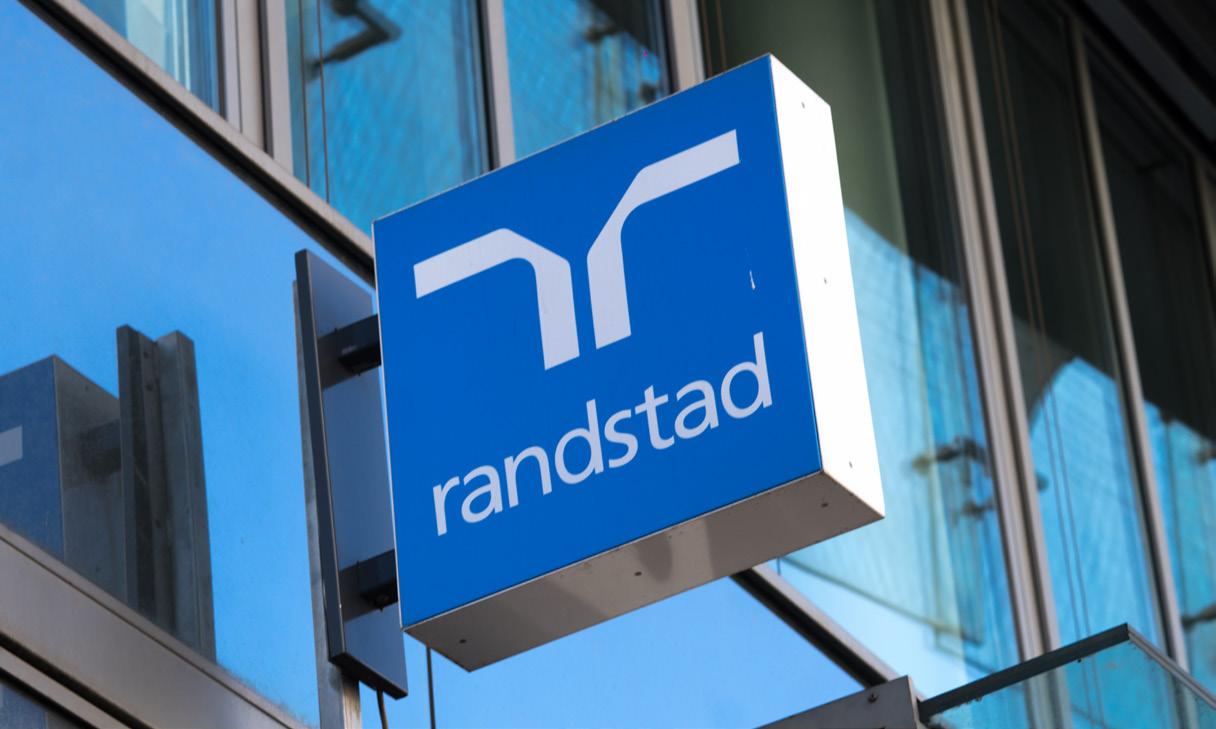
“Our employee acquisition plans are executed in accordance with our strategic priorities and business needs. We are hiring health product experts, and talents for our operations’ critical roles such as actuarial, claims, underwriting, sales, and customer service,” Kirmani said.
Keeping talents
To further expand their agent pool, Ivan Chan, Chief Agency Officer at Manulife Hong Kong and Macau said that they also launched a programme called Manulife IANG Talents (M.I.T.) to recruit non-local graduates with potential to the industry.

Meanwhile, FWD said digital talents are key to digital transformation for many companies to drive business growth.
“At FWD, we constantly recruit young talents such as Digital Graduates to fuel the digital journey of our organisation by using cuttingedge technology to address the evolving needs of today’s customers,” Miranda Au, Chief Human Resources Officer at FWD Hong Kong & Macau said.



Insurers also have a number of ways to keep these talents.
For AIA, their employee value
INDUSTRY INSIGHT: INSURANCE
training courses such as the C.E.O programme that equip employees with the right skill set to attain professional excellence.
“We also provide our agency force with advanced digital tools and ensure we have the best-inclass product solutions for them to offer to customers. In the past two years, we have expanded our agency offices in Kowloon East and launched a premium customer service centre in Tsim Sha Tsui to help our agents better serve their customers,” Chan said.
proposition “Believe in Better” epitomises a desire to create a healthier, more sustainable future together which the insurer tries to embed in various employee life cycle touch points.
“For example, we carry out surveys with new hires on a timely basis to understand their needs and have set up task forces to regularly review and enhance their onboarding experience. And as an advocate of grooming future talent and leaders, and fostering an inclusive culture by integrating people with diverse backgrounds and cultures, we offer a variety of workshops that focus on empathic leadership to strengthen people management ownership,”
Lee said, mentioning that AIA has rolled out several programmes aimed at improving the workforce well-being and providing a holistic well-being programme. Meanwhile, Chan mentioned that they invest strongly in their agents such as offering career development programmes and comprehensive
Manulife also has a massive recruitment plan for 2023, aiming to hire 3,000 agents before the year is up. FWD, meanwhile, takes its hiring to the next level by employing the use of current technology.
“We offer a quick and digitalised experience for any candidates. They can engage with us anytime and anywhere through AI chatbot, video interview, gamified assessment and e-contract to make the recruitment journey easier for everyone,” Au said.
FWD Hong Kong & Macau also brands itself as a vivid and compelling employer brand. Au said they had been conveying a young, energetic and innovative brand image to the community through multiple channels, such as recruitment fairs, and social platforms.
“We’ve also established various internal training and mentorship programmes to grow our employees’ skills and mentality, promoting a caring, sustainable and innovative culture for all to sustain high performance-driven culture,” Au said.
HONG KONG BUSINESS | Q2 2023 41
Insurers are hiring underwriters who have acquired work experience in Mainland China
Maylie Lee
Ivan Chan
Donna Kirmani
Miranda Au
HK, SG build stronger data centre hubs despite land limits
But lack of space for expansion remains a challenge for the top 2 Asian markets. Both have strong ecosystems, excellent connectivity, consistent demand
Hong Kong and Singapore have held their own as amongst the leading destinations for data centres in Asia and the world in 2022. Admirable as their feat stands amidst the lack of available land, how these markets sustain their growth with such limited space for expansion is a question worth answering.
In Cushman & Wakefield’s annual Global Data Centre Market Comparison report, Hong Kong ranked as the world’s fourth leading data centre market, climbing two places up. It followed Singapore, which slipped one place to third. Hong Kong and Singapore are the lone Asian markets to reach the top ten, a roster dominated by data centre markets based in the United States.
“Singapore and Hong Kong have reaffirmed their reputation as top data centre markets globally, despite a lack of available developable land, with Singapore’s new development parameters and Hong Kong’s generally high land prices,” the report read in part. The report was authored by Vivek Dahiya, Managing Director & Head, Data Centre Advisory Team, Asia Pacific, and Jacob Albers, Research Manager at Cushman & Wakefield.


“Both have strong ecosystems, excellent connectivity, consistent demand, and all major cloud services available and expanding where possible.” Cushman & Wakefield ranked the markets according to 13 weighted categories, which consist of high-weight criteria – market size, fiber connectivity, cloud availability; mid-weight criteria – incentives, taxes, political stability, vacancy, development pipeline, sustainability, and smart cities; and low-weight criteria – power cost, land price, and environmental risk to determine the top overall markets as well as the top performing markets in each category.
Hong Kong rated highly across the categories and emerged particularly strong in terms of connectivity, consistent demand, availability of cloud services, and its business-friendly tax structure offsetting its high land prices.
Singapore, meanwhile, showed a strong performance with a low vacancy rate, which reflects the high demand. Its low environmental risk and its status as a smart city also helped cement its rank despite its recently-lifted two-year moratorium on data centre development that
further limited stock. Cushman & Wakefield noted the ones that ranked low are either smaller markets that have yet to grow in capacity or markets hindered by environmental, cost, or regulatory hurdles. Environmental risks are relatively low in Hong Kong and Singapore, further underpinning their positions as major data centre markets.
“Singapore succeeded in locating data centres entirely outside of floodplains, ensuring that they are free from the risks of tornadoes, hurricanes, and earthquakes. Similarly, Hong Kong is one of the few studied cities with the lowest earthquake risk,” the report also noted. “This ensures that these markets’ data centres can maintain uptime, even if other sectors of the economy are disrupted due to environmental risks.”
Limited land supply
Cushman & Wakefield expects that Hong Kong and Singapore will maintain their lead in the short term, particularly due to their strategic economic and geographic importance.
“Both Singapore and Hong Kong also face a lack of suitable land for the development of data centres and, despite the end of the moratorium in Singapore, the government’s selective approach to new data centre development has restrained the growth rate,” Cushman & wakefield reported. In 2022, Singapore lifted the moratorium on data centre development, putting in place a set of new guidelines for more responsible development, energy usage, and sustainable practices. The low taxes and easing of restrictions allowed Singapore to record low vacancies of 2% during the year.

The market could also benefit from new cooling technologies, and novel data centre designs, such as floating or aquatic facilities.
Markets to watch
Land availability and high land costs are also amongst the key factors that have impacted emerging markets in the region. Cushman & Wakefield suggests this could be addressed by a combination of expanding to peripheral submarkets and through novel solutions.
42 HONG KONG BUSINESS | Q2 2023
Hong Kong is the world’s fourth leading data centre market
INDUSTRY INSIGHT: REAL ESTATE
Vivek Dahiya
Jacob Albers


HONG KONG BUSINESS | Q2 2023 43
CASE STUDY: SAVILLS HONG KONG
Savills pioneers next-level 3D interactive property tours in Hong Kong
Clients can see the whole property, tenants, and community virtually. This saves a lot of time for our tenants and buyers
Apicture can paint a thousand words, but it is just not the same as standing within the walls of the place you are looking to rent or buy—much more so if it is in a financial centre like Hong Kong. As a hub for foreign ex-pats and multinational corporations, Hong Kong needs to cater to potential real estate clients from all across the globe, so real estate firm Savills Hong Kong launched its interactive 3D models to allow clients a virtual tour of a place before committing to rent or buy. Through this technology, Savills is able to provide the near experience of standing and moving about that space as if the client has already moved in.
Godfrey Cheng, Deputy Senior Director of Savills Hong Kong, said travelling constraints brought at the height of the COVID-19 pandemic gave Savills the reason to come up with this new service.

“People, especially those from Singapore and our overseas clients, cannot go to Hong Kong physically at the time,” Cheng told Hong Kong Business. “We found this tool which offers property tours virtually so that the client could just click on the link and browse all kinds of information they may need.”
Transforming real estate investments in Hong Kong


Whilst the technology for 3D space capture has been available since the mid-2010s, Savills’s new technology has gone beyond the limitations of just touring a single space. Its technology allows clients to view whole buildings, as well as nearby tenants who might well be their next neighbours. “It is quite different from what we found on the market previously, which is only the Matterport-type virtual tour,” Cheng said. This technology has been on the market for five to six years, he noted, but usually only has a link to a single unit or a single floor. To offer its new service, Savills teamed up with startup Inspace
XR, which makes use of virtual reality and augmented reality to create interactive 3D models for the AEC (Architecture, Engineering, Construction) industries. This allows Savills to bring forth interactive, high-fidelity VR experiences to buyers, tenants and stakeholders beyond the confines of geography.
“For our 3D model, what we do is find the keywords that integrate all the elements in one link. An investor could just click a link, and they will be able to virtually visit the property,” Cheng explained.
He gave the magazine a tour of the service, which gives a view not just of the building’s interface, but also information regarding which tenants are in the property, for example. It also gives an overview of nearby infrastructure and buildings, even those that have not yet been fully built. For clients, Savills Hong Kong tailors a link to show them the keywords or details they may
particularly want to know about.
“This saves a lot of time for our tenants and buyers before they actually physically install in the property, because it saves them a lot of time from travelling,” Cheng said.
More than anything, the service positions Savills as a pioneer of interactive 3D model technology in the Hong Kong and Greater China real estate industry.

“As the first real estate services firm to formally adopt the interactive 3D model technology, we firmly believe it will prevail in the industry,” Raymond Lee, CEO, Greater China of Savills, remarked during the launch of the service.
“Working with Inspace XR, we hope to pioneer this technological breakthrough in our business operations in property investment, leasing and property management advisory, with a view to promoting the technology to a wider circle of asset management companies, REITs and developers that leads to the digital transformation of the local real estate industry,” Lee said.
44 HONG KONG BUSINESS | Q2 2023
INSPACE XR interactive 3D model (Photo courtesy of Savills Hong Kong)
Godfrey Cheng
Raymond Lee

HKB MANAGEMENT EXCELLENCE AWARDS
Recognising the top executives and companies at the 2022 HKB MEA
With recent shocks across industries thanks to circumstances such as supply chain disruptions, companies have had to work and push harder in order to succeed and thrive in this market environment. Executives have had to make tough calls and spearhead initiatives in order to push their businesses forward against their competitors, ensuring success in the long run.
Hong Kong Business Management Excellence Awards 2022 recognised the outstanding performances of individuals, teams, and companies as well as lauding revolutionary innovations that pave the way towards the future of business, bringing in tangible achievements for their companies. The winners were announced

via digital presentations from the 25th of November to the 9th of December 2022, with them sharing their thoughts on winning through virtual interviews.
This year’s entries came under the scrutiny of an elite panel of judges made up of Jacky Lai, Assurance Partner at Ernst & Young; Ivan Chan, Audit & Financial Advisory Services Partner at Mazars in Hong Kong; Samson Lee, Assurance and Business Advisory Services Partner at SHINEWING (HK) CPA Limited; and Eugene Liu, Managing Partner at RSM Hong Kong.
Congratulations to the winners!
Hong Kong Business congratulates the following winners:

Executive of the Year
• Logistics - Rui Hua Chang, ESR Group Limited

• Non-Profit Organisation - Willy Lin, HONG KONG PRODUCTIVITY COUNCIL
Innovator of the Year
• Logistics - Rhenus Logistics Hong Kong Limited
• Materials & Construction - Traxon Technologies Ltd
Team of the Year
• Oil & Gas - Shell Hong Kong Limited
COVID Management Initiative of the Year
• Environmental Services - China Tech Global (Holdings) Ltd
• Healthcare - Gleneagles Hospital Hong Kong
46 HONG KONG BUSINESS | Q2 2023
EVENT:
ESR Group Limited
Gleneagles Hospital Hong Kong

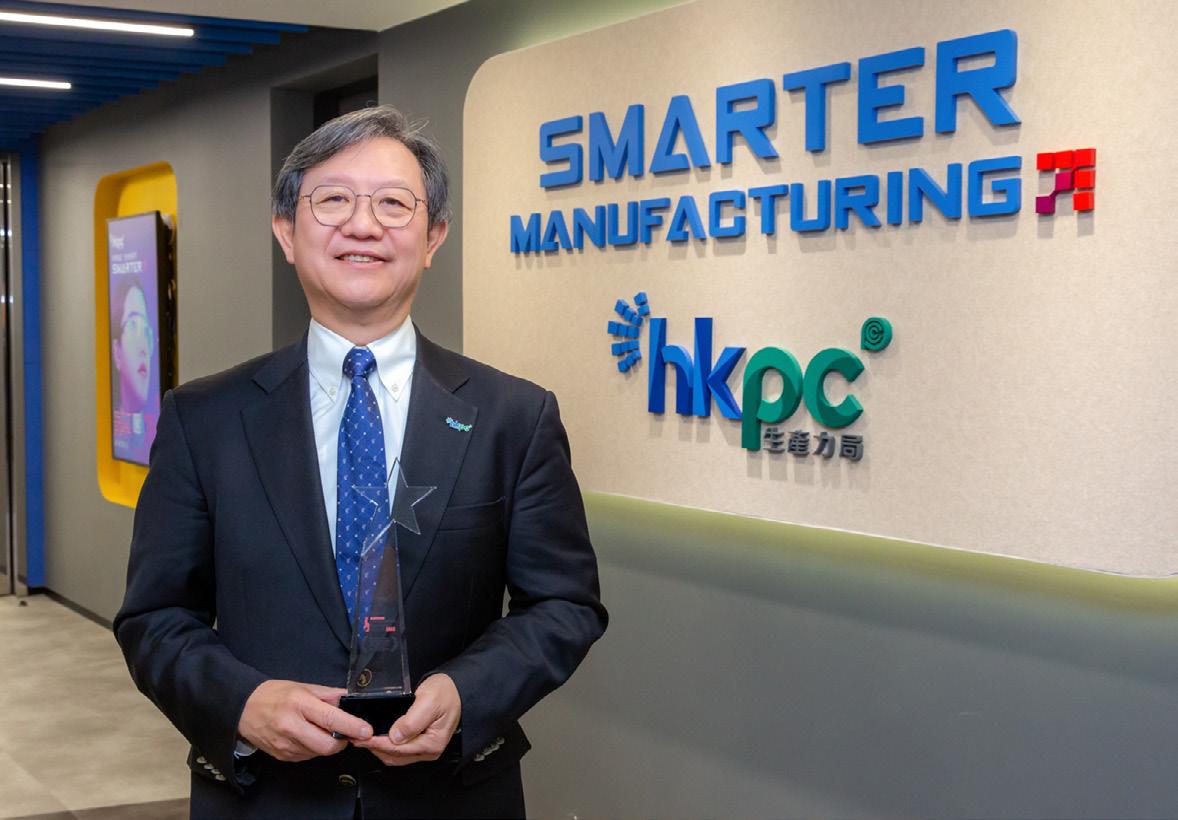


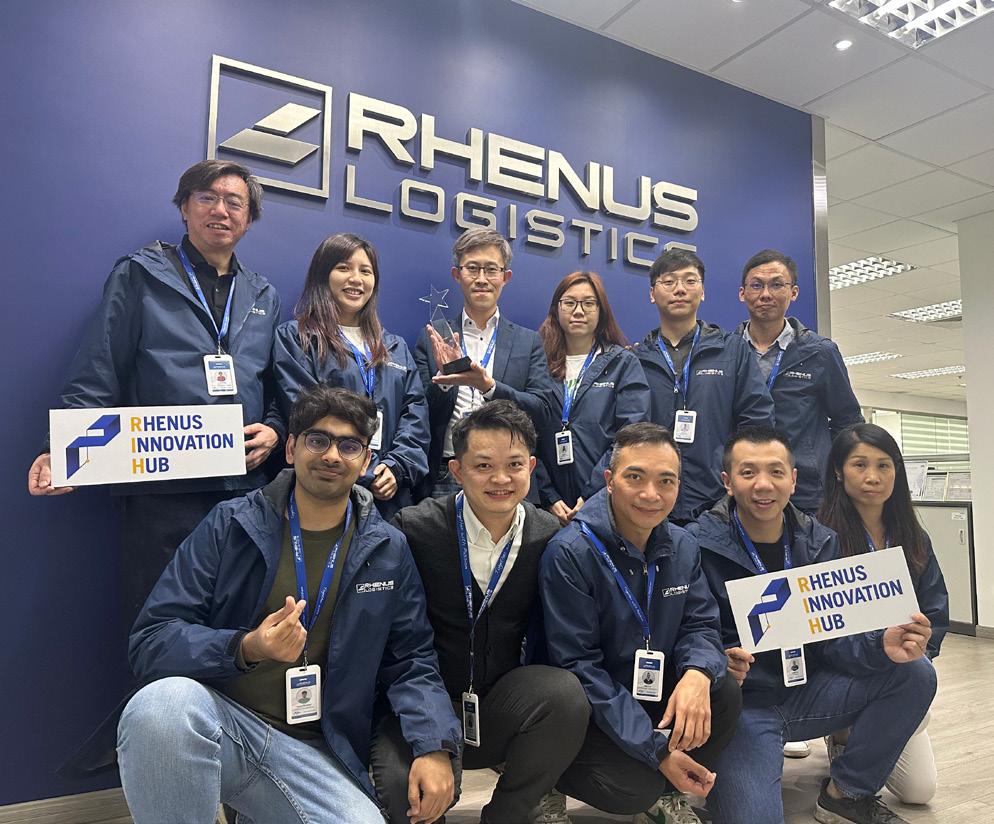

HONG KONG BUSINESS | Q2 2023 47
HONG KONG PRODUCTIVITY COUNCIL
Shell Hong Kong Limited
Rhenus Logistics Hong Kong Limited
Traxon Technologies Ltd
Accelerating into the future with Shell Recharge EV charging stations
The company is leading the industry by establishing the first one-stop service station to promote green transport and reduce carbon emissions.
Shell’s Powering Progress Strategy focuses on working with our customers and across sectors to accelerate the transition to net-zero emissions, in step with society. As one of the world’s largest energy suppliers, Shell has the ambition to become a net-zero emissions energy business by 2050.
Responding to the growing needs of electric vehicle (EV) drivers, Shell launched the first Shell Recharge EV charging station in Hong Kong in 2021. With the agile team’s effort, Shell’s EV charging stations have now expanded to 11 EV charging stations at Shell service stations, shopping malls, commercial buildings and residential car parks, providing easy and convenient charging for all EV drivers.
As of today, Shell is still the only oil company in Hong Kong to offer an EV charging network.

The Shell Airport (Cargo Terminal) Gas
and Charging Station is the first and the only one-stop service station in Hong Kong covering EV charging, refuelling, car lubricant change, car care and car wash services. In addition to 16 fueling points, two DC fast and two AC mid-EV charging points are available to meet the different needs of EV drivers. The user-friendly Shell Recharge APP allows customers to search for and book chargers as well as make payments, providing drivers with a seamless charging experience.
Driving sustainable progress
To further encourage green transport and promote sustainable development in the region, Shell and Sino Group have collaborated to establish the fastest universal EV charging station in China Hong Kong City. Compatible with the majority of EV brands and models, Shell Recharge’s CCS-Combo 2 provides 300kW super-fast charging service, making an EV with a high voltage battery that can be fully
charged within 15 minutes1
Shell is also working closely with different major landlords to lead the industry and reduce carbon emissions in a proactive manner. Partnering with New World Development Company Limited and Link Asset Management Limited, Shell will launch new and large-scale charging facilities at more than 38 of their properties by Q4 2023. In addition, Shell also collaborates with different car manufacturer brands and agents like Hyundai Hong Kong Co. Limited to offer exclusive charging plans and discounts for Hyundai’s drivers.
Building on the initial successes, B2B partners and customers are now actively consulting Shell to adapt to the energy transition in their respective business contexts. It is foreseeable that more and more customers will recognise Shell as a brand leader in the EV charging segment and rely on Shell’s suggestions to help make a more positive impact on their company and society.
48 HONG KONG BUSINESS | Q2 2023
The Shell Airport (Cargo Terminal) Gas and Charging Station is the first and the only one-stop service station in Hong Kong
Emily Leung, General Manager of Mobility of Shell Hong Kong Limited
TEAM OF THE YEAR - OIL & GAS
1 New EVs models that are able to support faster transmission speed will be able to charge from 20% to 80% in 15 minutes.


HONG KONG BUSINESS | Q2 2023 49
APAC’S LEADING REAL ASSET MANAGER POWERED BY THE NEW ECONOMY

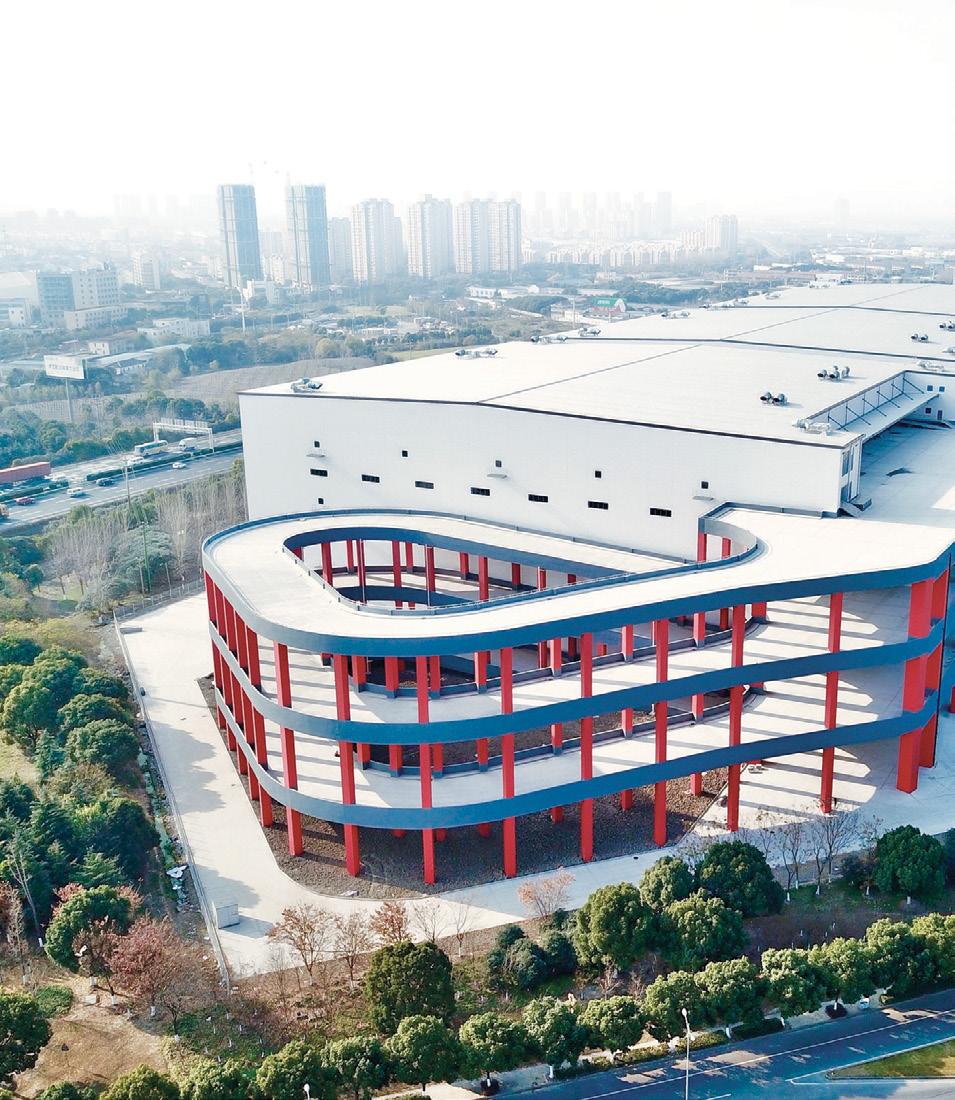
With our industry-leading efforts ranging from capital raising to green initiatives and sustainable operations, ESR has set benchmarks in the industries we serve.

50 HONG KONG BUSINESS | Q2 2023
INVESTMENT DEVELOPMENT
FUND MANAGEMENT
out more at ESR.COM
Find


HONG KONG BUSINESS | Q2 2023 51
Here are the winners of the HKB Made in & Designed in Hong Kong Awards 2022
With the changing demands of customers over the years, innovative products and solutions have sprung up to plug the gaps in service and convenience. Companies who have pushed towards putting themselves over their competitors have found success as Hong Kong Business recognises their remarkable developments and products in the Made in and Designed in Hong Kong Awards 2022.

The Made in Hong Kong Awards commends products that are manufactured in Hong Kong across industries, whilst the Designed in Hong Kong Awards praise the products that have their roots in a Hong Kong-based office despite being manufactured outside the territory.

Made in Hong KongAward
Mannings Hong Kong
Healthcare
The COVID-19 pandemic produced a dire scarcity of masks, making them almost inaccessible to mass customers. Mannings, seeing the high demand, worked towards producing their three-ply protection face mask level 3, offering a safe and more comfortable face mask in the market.
First launched in 2020, Manning masks were repurposed and relaunched in September 2021, satisfying international standards with fluid-resistant material and high-quality filters in their ISO 13485 factory. As a trusted health and beauty brand, Mannings masks improved quality for both adults and children as the breathable material of the masks meets standards for safety and efficacy.
The masks passed ASTM Level 3 standard testing, the highest standard from ASTM, and are developed to pass toxicology tests in bio-compatibility testing. Third-party testing on hygienic control standards also gave Mannings the green light on how clean and hygienic the masks were for users.
Companies were awarded through an online awards presentation, and have shared their thoughts on winning in the prestigious awards programme through virtual interviews.

Nominations went under the scrutinous eyes of this year’s distinguished panel of judges, made up of Alice Yip, KPMG China’s Partner and Head of Audit – Consumer & Retail for Hong Kong; Michael Cheng, PwC Hong Kong’s Asia Pacific, Mainland China, and Hong Kong Consumer Markets Leader; Andrew Lee, Ernst & Young’s Partner, Markets, Greater China; and Falcon Chan, Partner at Deloitte China and leader of Deloitte’s M&A Consulting Services in Southern China.
Congratulations to the winners!
Designed in Hong KongAward
Lenzing Fibers HK Limited
Luxury
Derived from wood pulp sustainably sourced from managed forests and produced in Austria, TENCEL™ LUXE is a new lyocell filament that utilises a sustainable closedloop process which has been used in collaboration with the Hong Kong Fashion Designers Association (HKFDA) to develop an eco-fashion collection that showcases sustainable couture and ready-to-wear outfits.
Lenzing successfully launched the TENCEL™ LUXE eco-fashion collection at CENTERSTAGE HK, organised by the Hong Kong Trade Development Council (HKTDC), exhibiting fabrics created by long-term partner mills across China, HK, Japan and Korea.
Aiming to promote a green culture within the fashion and textile industry in Hong Kong, the latest sustainable product range, TENCEL™ LUXE lyocell yarns have driven commercial impact and educated many on sustainability for a better future. Supply chain stakeholders are treated with the TENCEL™ LUXE virtual fabric library, showrooms, and fashion runway videos to demonstrate the impact of Lenzing’s sustainability journey.
EVENT: MADE IN & DESIGNED IN HONG KONG HONG KONG AWAR D S 2022 MA D E IN AWAR D S 2022 HONG KONG D ESIG N ED I N
Mannings Hong Kong
Lenzing Fibers HK Limited


Designed for you: How Mannings’ face masks were redesigned for public safety
The onset of the COVID-19 pandemic saw the supply scarcity of medical equipment such as face masks. Worse, people came into a frenzy and face masks instantly became inaccessible to the masses. This has led not just to the need to produce supplies at a much quicker rate, but also to the rise of positive cases from the virus.
Mannings, as one of Hong Kong’s leading and trusted health and beauty products chain stores, embarked on a mission to support the community in times of need aligned with its company’s core values. Its face mask products were identified as a strategic opportunity to be redesigned and relaunched to meet customers’ changing needs and expectations in staying protected.

The Mannings 3-Ply Protection Face Masks were redeveloped in September 2021 after its initial launch in 2020. This relaunch aimed to serve a wider goal to protect the Hong Kong community. It offers a credible assortment from core to new products. The range has been extended from adults to kids.
“We are agile to ensure that new trends and changing customer dynamics are taken into consideration to continuously develop



relevant products for our customers,” the company said.

The product is manufactured in an ISO 13485 factory. It has fluid-resistant materials and a high-quality filter; it has also been tested against skin irritation, sensitisation, and cytotoxicity. Moreover, the masks have breathable material that meets the international standard quality of safety and efficacy.
It has also passed the highest standard of ASTM, which is amongst the most wellrecognised mask test standards or quality credentials in Hong Kong. Mannings 3-Ply Protection face masks featured additional testing that required additional time and investment to ensure the products pass the toxicology test on product safety for longhour wearing.
Engaging customers with quality initiatives With












such features and specifications,
the 3-Ply Protection face masks led sales, volume and profit within the face mask category. Moreover, the product and assortment transformation plan of Mannings was designed to focus on improved quality and a wider assortment of choices for customers.

New initiatives were also launched to educate and engage customers. These included new mask fixtures with prominent customer navigation to help them make their choice.
Mannings’ efforts to educate people on the benefits of using 3-Ply face masks and the quality of its product have been recognised by the Made in Hong Kong Awards 2022, with the company winning in the Healthcare category.
The prestigious awards programme recognises exceptional products that are proudly manufactured and designed in Hong Kong.





54 HONG KONG BUSINESS | Q2 2023
Its 3-Ply Protection face masks have fluid-resistant materials and high-quality filters.
We are agile to ensure that new trends and changing customer dynamics are taken into consideration to continuously develop relevant products for our customers
HEALTHCARE
Mannings Plus




















































































HONG KONG BUSINESS | Q2 2023 55
EVENT: GREATER BAY AREA ENTERPRISE AWARDS
Exemplary companies and organisations were recognised in this year’s GBA Awards
With great potential as a global technology hub in the upcoming years, the Greater Bay Area (GBA) made up of Guangdong, Hong Kong, and Macao have become a hot destination for companies looking for success and growth. The geographic location of the GBA lets organisations reach out to both Southeast Asia and Mainland China, penetrating markets with the strong positioning the location provides.

Developments and initiatives that have demonstrated successful economic impact for the development of the Greater Bay Area were commended in the 2nd Greater Bay Area Enterprise Awards presented
by Hong Kong Business. Such initiatives include technological advancements and solutions in the field of digital banking, marketing, and telecommunications amongst others, providing support to Hong Kong SMEs and other international companies and ensuring better service quality for customer experience.



The awards programme was presented via virtual awards presentations during the 2nd week of December 2022, with companies sharing their thoughts on winning through virtual interviews.
Congratulations to the winners!
Hong Kong Business congratulates the following winners:
Allianz Trade in Asia Pacific
Business Insurance
Hang Seng Bank Limited
Digital Banking
HKT Limited
Telecommunications
Hong Kong Productivity Council
Automotive & Transport System
Manufacturing Technology
Allianz Trade in Asia Pacific
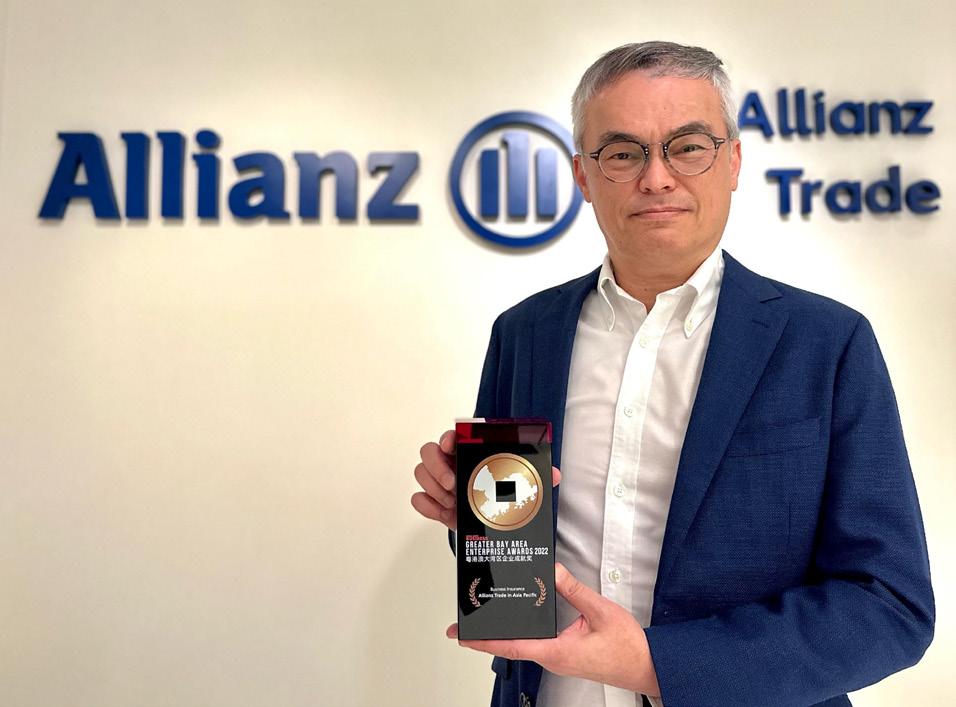
Hong Kong Trade Development Council
Non-Profit or Government Organizations
Mead Johnson Nutrition (Hong Kong) Limited
Infant and Child Nutrition
Standard Chartered Bank
Supply Chain Finance
Hang Seng Bank Limited
Hong Kong Productivity Council
56 HONG KONG BUSINESS | Q2 2023





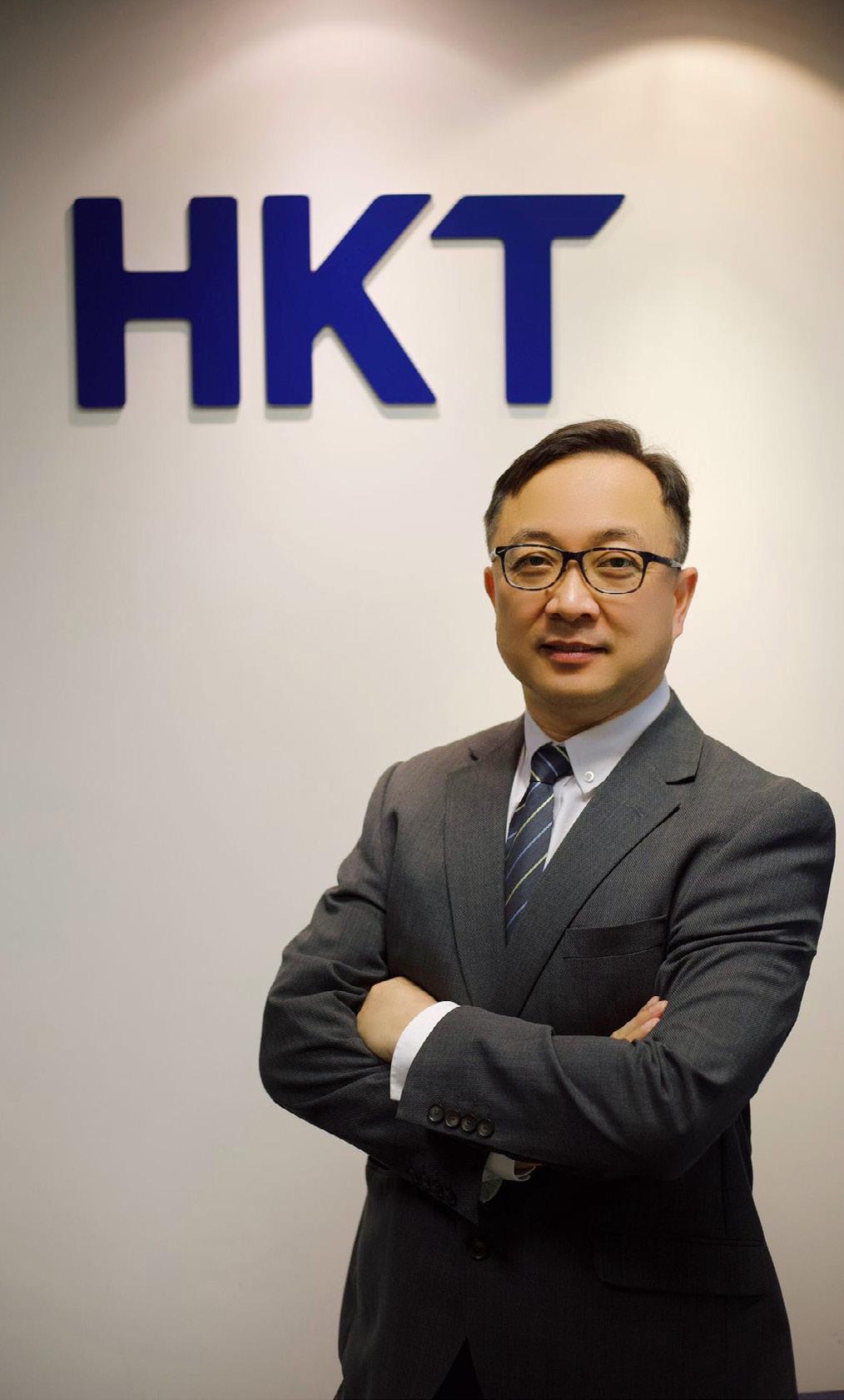
HONG KONG BUSINESS | Q2 2023 57
Hong Kong Trade Development Council
HKT Limited
Mead Johnson Nutrition (Hong Kong) Limited
Standard Chartered Bank
The silver lining for global trade
operating outside of Mainland China and exporting from Greater China ports, it is more critical than ever that trade credit insurance policies are aligned between locations with no gaps in coverage.
Our newly set up China-Hong Kong Corporate Solutions platform provides Chinese companies with bespoke policy terms that cover both domestic sales in China and international exports via ports in all Greater China markets. Key benefits of this platform include:
• One-stop trade credit insurance service to formulate a credit insurance policy that is suitable for both domestic sales and export business in China and Hong Kong, and compliant with both markets at the same time
• Worldwide database with local expertise to help customers to filter high-quality customers and develop new markets
• Access to funding with better financing terms
Despitedisruptive events that took place in H1 2022 such as the war in Ukraine and prolonged lockdowns in China, global trade of goods grew by +4.1% y/y during that period nonetheless. However, weakening global demand amid sustained inflation, long replacement cycles of durable goods and depleted excess savings have reversed the trend.
From a supply and manufacturing perspective, whilst the situation differs from one sector to another, corporates generally show no signs of increasing stocks in the short term. In fact, an inventory glut is visible and particularly destructive for retailers. With most of these factors set to persist in 2023, trade growth is likely to remain muted this year.
China’s reopening reduces the risk of sudden stops in global supply chains whilst supporting global demand, albeit moderately. On the supply side, several critical intermediate goods are produced, transited and shipped out of China and Asia as a whole. Normalising domestic and port logistics bode well for global manufacturingsupplier delivery times, which are back
towards the long-term average. Maritime freight rates for routes from China to Europe and North America also mostly returned to their respective pre-pandemic levels since the beginning of this year.
From a demand perspective, the more optimistic economic outlook for China implies an upward revision of Chinese imports in 2023 by nearly US$80bn. In absolute terms, exporters that will benefit the most from this increase are likely to be those in Hong Kong (+US$13bn of additional export gains in 2023), the US (+US$6bn), South Korea (+US$5bn), Japan (+US$5bn) and Germany (+US$5bn).
As such, we are revising slightly our forecast for global trade volume growth in 2023 from +0.7% to +0.9%.
Uniting domestic sales and international exports

China has been Hong Kong’s largest trading partner since 1985. Whilst Chinese companies usually choose Hong Kong as their important export hub, domestic sales in China continue to develop strongly which provides Hong Kong companies with unprecedented business opportunities. With more Chinese companies

• International debt collection services help to recover business debts with peace of mind
Secondly, the global B2B e-commerce market has grown to six times larger than that of B2C. In Asia Pacific, it is projected to grow at a CAGR of 22% until 2030. Whilst 95% of B2B buyers prefer paying on credit terms just as they can when buying offline, less than 10% of e-merchants offer such an option. Innovative payment options such as Buy-Now-PayLater (BNPL) are now key differentiators for e-merchants and marketplaces. Research has shown that 29% of B2B buyers would opt to abandon their shopping carts if their preferred payment option is not available.
As the world’s largest trade credit insurer with over 120 years of company and payment data collected worldwide, Allianz Trade is well positioned to support the evolution of B2B e-commerce and business exchanges that are rapidly shifting online. Powered by an application programming interface (API) and based on REST standards, our innovative E-commerce Credit Insurance allows e-merchants to offer deferred payment terms to buyers in real time with credit risks protected.
allianz-trade.com/pricing


58 HONG KONG BUSINESS | Q2 2023 Contact us Talk to us today to understand more.
Allianz Trade offers innovative solutions to support Chinese domestic sales and international exports as well as the booming B2B e-commerce.
BUSINESS INSURANCE
Additional export gains from China’s reopening (in US$bn)
Source: Allianz Research
Anumber of key national plans have highlighted the tremendous opportunities that lie in the GBA (Greater Bay Area) for both local Hong Kong and multinational enterprises. As a result, many enterprises are now expanding their businesses and driving their digital transformation through emerging technologies to capture new opportunities in this important market.
They aim to increase operational efficiency, enhance market presence, and gain a foothold in the China market by doing so. On the evolving digital transformation journey, many enterprises speed up cloud adoption to maximise scalability and business growth.
Strong network coverage across all GBA cities with 24/7 support
HKT is well-prepared to support the needs of fast-growing businesses and provides a variety of integrated solutions that have already helped a number of enterprises in different sectors successfully accelerate their digital transformation.
The company provides strong network coverage in all the 9+2 GBA cities, including the two special administrative regions of Hong Kong and Macau. With 24/7 technical service support in both Hong Kong and China, HKT has the resources to help enterprises expand their businesses smoothly in this competitive market.
Managed Security Services with high standards
The hybrid workplace is now the new normal for many enterprises that have adopted the cloud to scale up their businesses and facilitate a more agile work environment. HKT provides a variety of integrated solutions to accomplish
this. Its Managed SD-WAN solutions with 5G capabilities support reliable and scalable interconnections between an enterprise’s branches, headquarters, and clouds whilst simplifying network complexities, reducing network operation costs, and benefiting enterprises with multiple offices and branches in different locations.
Together with the company’s Managed Secure Access Edge service, the combined solutions allow for the seamless integration of additional cybersecurity capabilities into cloud-based frameworks for end-to-end protection and the enhancement of corporate network security from the ground up.
HKT is the first Hong Kong-based service provider to receive an SD-WAN + Cloud Network Convergence Award from the China Academy of Information and Communications Technology (“CAICT”), a scientific research institute directly under the Ministry of Industry and Information Technology (“MIIT”), at the SDWAN Excellence Awards in 2021. HKT has also been accredited with SD-WAN Ready 1.0 and 2.0 certifications, which further demonstrate that the company’s SD-WAN with Managed SASE solutions have attained technical compliance with the latest SD-WAN standards and guarantee security performance in mainland China.
Empowered Chow Tai Fook’s cross-border digital transformation
Amongst HKT’s customers is the Chow Tai Fook Jewellery Group, which approached HKT to improve its network infrastructure at over
8,000 locations across China.
HKT achieved some remarkable records during the project, including the installation of SD-WAN in over 100 shops in one day, the completion of an urgent shop activation within 12 hours, and the increase of a shop’s effective bandwidth by over 10 times. HKT successfully helped Chow Tai Fook in its deployment of cloud-based smart retail technologies. These achievements show that HKT’s services are in full compliance with the latest standards in China and that the company has rich experience in emerging technologies and delivering guaranteed performance.
Patrick Tsang, General Manager of the Information and Communication Centre, at the Chow Tai Fook Jewellery Group said, “HKT played a key advisory role in our transformation project. This enabled us to greatly enhance our customer services and satisfaction levels. Our network performance has also improved enormously after adopting HKT’s managed SD-WAN services.”
As a leading ICT and digital solutions provider in Hong Kong, HKT’s professional team has experience across many different industries. HKT Enterprise Managed Services (EMS) provides enterprises with all-around managed services such as an integrated technical helpdesk, multi-skilled on-site support, automation, tools, and more to ease their IT burden and enhance the efficiency of their operations.
HKT’s success in driving digital transformation in the GBA, as well as in providing reliable and scalable Enterprise Managed Service (EMS) to different enterprises, was recognised at the HKB Greater Bay Area Enterprise Awards 2022, with HKT winning in the Telecommunications category.

The prestigious award honours outstanding companies for their excellent performance and commitment to driving collaborative and economic development between Hong Kong and the Greater Bay Area.

HONG KONG BUSINESS | Q2 2023 59
The
company was recognised with the Telecommunications trophy at the HKB Greater Bay Area Enterprise Awards 2022.
HKT empowers digital transformations to help businesses capture opportunities in the GBA
TELECOMMUNICATIONS
HKT will keep exploring the integration of the latest digital innovations and technologies to enhance business performance, efficiency, and customer satisfaction























60 HONG KONG BUSINESS | Q2 2023
Offering the golden formula whilst driving engagement and improving parent knowledge
Mead Johnson Nutrition Hong Kong (Mead Johnson) once again clinched the top award for its Enfa A+ upgraded formula in the Infant and Child Nutrition category at Hong Kong Business Greater Bay Area Enterprise Awards 2022, demonstrating their excellent performance and commitment to driving collaborative and economic development between Hong Kong and the Greater Bay Area.
Mead Johnson has led the way in developing safe, high-quality, innovative paediatric nutrition products, guided by the mission to nourish the world’s children for a better start in life. The Enfa A+ upgraded formula is crucial in helping MJN achieve its mission in the Greater Bay Area, showing its commitment to parents and child development in Hong Kong as well as South China markets.
Upgraded Enfa + formula
Mead Johnson designed Enfa A+ upgraded formula to give babies and children a better start in life and made the formula accessible to South China parents with a regionwide campaign in 2022. Through the project, Mead Johnson distributes the formula across Mainland China using cross-border platforms. Moreover, the brand is also
dedicated to driving consumer engagement and improving parent knowledge.
“The Enfa A+ formula is Mead Johnson’s first product that included DHA and ARA as ingredients. It is a pioneering achievement for milk powders that promote infant brain development. Since the Hong Kong launch of Enfa A+ in 2000, consumers have continuously rated it as the top infant milk formula for over ten consecutive years. It is also the leading brand paediatricians recommend for child brain development in Hong Kong. The new Enfa A+ upgraded formula adds HMO, a nutritional ingredient in assisting human health recognised by top researchers in recent years. Children’s immune systems benefit from this ingredient, strengthening their intestinal health. Our mission for a better start in life for every child has taken a significant step forward with this excellent product,” said Mr Pankaj Agarwal, General Manager, Cross Border, Hong Kong & Taiwan of Mead Johnson Nutrition (Hong Kong) Limited.
With the huge success in the Hong Kong region, the brand wanted to bring the benefits of the product to the South China markets in achieving its mission. However, reaching out to consumers across borders is never easy, not to mention all the ongoing challenges to the

business brought upon by the pandemic.
The brand overcame all these difficulties by using an integrated strategy involving various online and offline touchpoints during the launch of the Enfa A+ upgraded formula. They also made product-related information readily available, allowing parents in South China to understand more easily before making the choice for their children’s and babies’ nutritional needs.

Boosting parental empowerment
The engaging Enfa A+ upgrade launch inspired hundreds of partners and channel customers to assist parents during the launching event last year. Besides making high-quality infant and child nutrition products accessible, the brand also partnered with healthcare experts to help parents navigate the challenging journey of providing their children with a better start in life. They followed up by sharing scientific knowledge on nutrition and parenting on social media such as TikTok and Weibo to keep the parents engaged and informed in the most convenient ways.
The direct and indirect multi-modal efforts helped Enfa A+ upgraded formula earned positive word of mouth and recommendations by consumers across numerous baby vertical social networks including Wechat, Xiaohungshu and TikTok. The brand also established a strong band online community.
“Apart from providing high-quality products, we continue to drive innovation in infant and child nutrition products and collaborated with healthcare professionals to help parents address concerns and difficulties in baby care and parenting. The goal was to empower parents so they could give their children a better start in life,” said Pankaj Agarwal continued. “We have confidence in the region’s prospects and will continue to leverage our scientific innovation and professionalism to bring more paediatric nutrition products to the market across Hong Kong and the Greater Bay Area.”
HONG KONG BUSINESS | Q2 2023 61
Mead Johnson Nutrition Hong Kong wins in the Infant and Child Nutrition category for its upgraded Enfa A+ formula.
INFANT AND CHILD NUTRITION
We will continue to leverage our scientific innovation and professionalism to bring more paediatric nutrition products to the market across Hong Kong
and
the Greater Bay Area
JOHN HOWALD OPINION
Navigating the reset of Asia Pacific’s real estate industry: A return to stability
Real estate is by no means immune to the volatility impacting capital markets. The current macro environment offers no shortage of reasons for investors to hesitate in pursuing opportunities. Many are confining capital to the sidelines, awaiting more clarity and for relative stability to return. The good news is that a recalibration is underway. Our 2023 Global Investor Outlook Report found the global real estate market will start to stabilise by mid-2023 as more certainty emerges around the interest rate outlook. Investors must view recent trends not so much as a downturn, but as a return to relative rationality.
This is especially good news for Asia Pacific investors as they are more highly attuned to some advantages across asset classes, compared other major markets around the world.
So in a time where extreme caution is being exercised, guidance is gold. There are five main themes – specific to Asia Pacific – that investors must take note of.
Asia Pacific’s relative dynamism and diversity
From a global perspective, the Asia Pacific region’s relative optimism on growth stands out. The region is incredibly diverse in terms of the scale of its markets, pace of development, and even the direction of monetary policy. There are several key forces accelerating across Asia Pacific. The most eminent is the flight to quality in the office sector. Companies are driving this trend by providing high-quality office environments to attract and retain employees, which also aligns with a growing emphasis on sustainability ratings.
Retail is also benefiting from this trend. Regional investors are showing a clear uptick in their intention to invest in CBD retail, in comparison to those in EMEA and the U.S.
Investors set to increase exposure across the region
Asia Pacific is expected to outperform all other markets in 2023 as a haven for property investments. There are significant headwinds in Europe and the U.S. with real risks of recession. As the debt markets stabilise and volatility fades, private equity is also expected to ramp up M&A activities this year.
Most of the western world pension funds or insurance capital and other sovereign wealth funds, are generally underweight in their exposure to the Asian markets. They’re now becoming more aware of that, as they may be over-allocated to their local markets which are going to be potentially the most impacted by interest rate trends. A lot of European or North American funds will try hard to gain exposure to the Asian markets and allocate large amounts of capital here.
Diversity of opportunities across sectors
Office and industrial and logistics (I&L) sectors are the frontrunners when it comes to investor choice, followed by multifamily, which now notably outpaces retail and hotels.
JOHN HOWALD Executive Director, Head of International Capital Asia Pacific, Colliers

In alternatives, investors are keen not just in data centres, but also life sciences and senior housing. This could be evidence of rising awareness and/or desire for assets with a strong connection to fundamental trends in a generally tough environment.
Alternative asset classes supported by strong population growth and demographic fundamentals currently offer a unique investment proposition that provides exposure to growth industries. They also support portfolio diversification and lower risk asset assets offering a long-term cash flow with reduced levels of rental downtime.
Action on environmental performance to increase
Investors are placing a big emphasis on environmental, social and governance (ESG) criteria and ratings in response to occupier demands and to balance out asset operational costs longer-term. It’s also known that ESG-compliant assets will command a premium in the future.

More Asia Pacific investors are expected to complete full asset assessments in terms of their energy efficiency and performance this year or integrate new ESG performance benchmarks. Non-compliant assets will increasingly be confined to discounted territory and targeted for redevelopment or disposal.
Heading into 2023, Asia Pacific will be a relative winner in the rebalancing of real estate values and overall return to relative rationality, as there still are investment opportunities within the context of today’s economic environment.
62 HONG KONG BUSINESS | Q2 2023

HANNAH JEONG OPINION
How enhanced green technology helps companies with purpose
HANNAH JEONG Head of Valuation & Advisory Services, Colliers Hong Kong

How the cost of climate risk is measured
The recent ULI Hong Kong Conference focused on 2023 being a pivotal year for the city’s future as an international finance centre and how the real estate community can impact Hong Kong’s resilience and drive sustainability. Resilience and sustainability are pivotal to investors’ decisions to buy an asset. They have become increasingly important as we feel the effects of climate change. Even though investors might only hold a property for a short period, when they divest it, they cannot expect buyers to take care of climate-proofing without a substantial discount on the price. This caution illustrates ESG’s importance, as this score directly affects an asset’s value.
Sustainability is being considered in real estate valuation already. But, while it is essential, it is not yet a critical factor that impacts value. Property valuations give the seller’s profile, and external market matters more weight. Green building certification indicates that the owner has future-proofed the building, investing in hardware and software to increase its attraction to tenants.
Companies without a purpose are no longer sustainable. As so many young people today aspire to live in a better world, the domino effect of their choices to be environmentally and socially conscious reaches all companies.

Transparency is critical to companies winning hearts and minds and business. As companies make tough choices around their ESG goals, they will be looking at their supply chains and those companies’ ESG scores to enhance their savings.
Determining a company’s purpose begins with identifying a problem that needs to be solved. The United Nations Sustainable Development Goals (UN SDGs) provide a good starting framework, comprising 17 interrelated goals with broad scope for interpretation.
Take UN SDG number five – Gender Equality; a company goal could be to improve its gender ratio through more equitable hiring practices and ensuring women are represented and supported in the workplace. To be successful, the company must communicate its goal clearly to staff to bring them on board. Aligning with the stated purpose will allow the company to harness potential focus and goodwill to accelerate its success.
The technology gap
Once staff are engaged in a company’s mission to reduce its carbon footprint, the right tools are required to measure its efforts.
For example, a company might currently record how much it spends on fuel as a matter of accounting but cannot relate this figure to environmental impact and the progress of its ESG goals.
It must know how much fuel it uses to pinpoint its carbon footprint.
This gap in our ability to measure carbon emissions must be bridged with better technology and AI (Artificial Intelligence).
With the rise of the Northern Metropolis and its technopole, we can look forward to more accessible and more accurate means to do this.
Climate risks are priced into the real estate market using the Climate Value-at-Risk model. This fully quantitative calculation provides a forward-looking, return-based assessment to measure an investment portfolio’s climate-related risk. The model combines physical climate and transition risk (hazard x exposure x vulnerability). Investors focus on future-proofing to manage risk and should price in the estimated CapEx to do that. While the “green premium” – the extra paid for future-proofed assets – has not moved the needle in terms of investment, the “brown discount” can drop an asset’s value by as much as 10% in Asia.
Brown discounts are not shown imminently but indicate the greater risk of value decline, stagnant rents, and being labelled as a stranded asset. On the other hand, lenders will quantify the future exposure of all assets in their loan book to support regulatory reporting.
Data gaps and how they are mitigated
There are several data gaps in current valuations. Platform providers vary on which events are climate risks, making it challenging to extrapolate Climate Value-at-Risk (VaR) from the year 2100 to more imminent implications. Valuers can mitigate this by using the appropriate assessment tools according to purpose, for example, using Climate VaR for investors, but doing a deep-dive technical analysis will be more informative to a General Partner that will redevelop a site. Climate risk does not significantly impact the property in the near future, so it is being deferred to the subsequent buyers. To prevent this, we need thresholds for risk levels and standardised future-proofing action plans based on each risk level.
Deciding which climate scenarios to use for a valuation is challenging. For investor relations purposes, the analysis can be narrowed down to three climate scenarios spanning best to worse case, but additional scenarios need to be considered when the property undergoes re-development.
64 HONG KONG BUSINESS | Q2 2023
YOUR ASSET PROTECTION SPECIALIST
Utilizing Trusts and International Retirement Planning Solutions to Minimize Taxes.

Applicable to any assets held in the UK irrespective of your nationality.
Income Tax 20% – 45%
Pay less overall than you currently do
SDLT 3 – 17%
Apply for a tax refund
CGT 18 – 28%
Reduce or eliminate Capital Gains Tax
IHT 40%
Mitigate using HMRC initiatives
HONG KONG BUSINESS | Q2 2023 3
Contact us for a FREE Tax Review www.soteriatrusts.com


4 HONG KONG BUSINESS | Q2 2023



















































































































































































































































































































